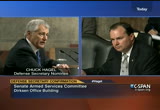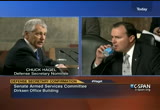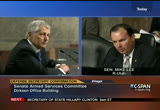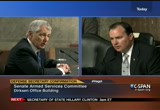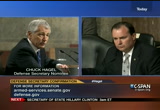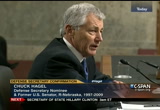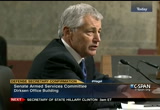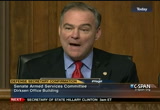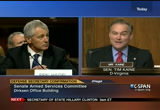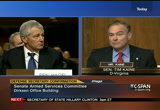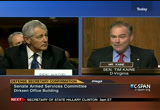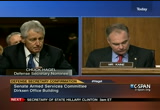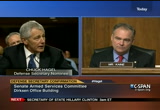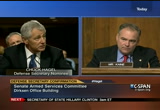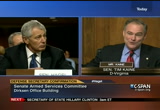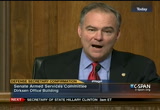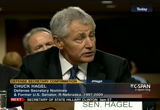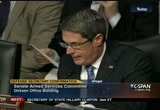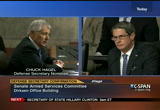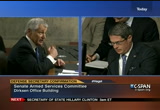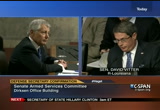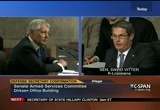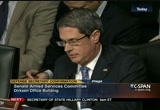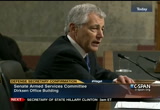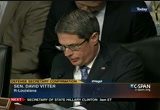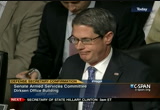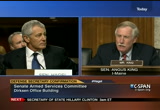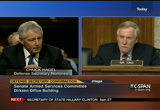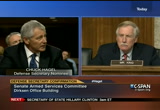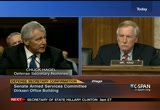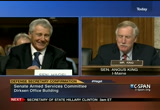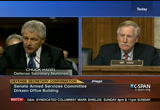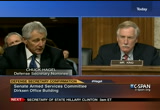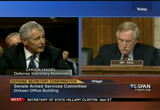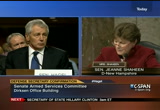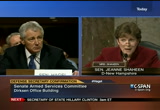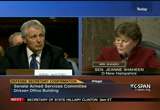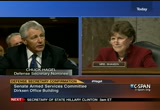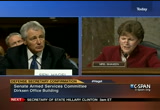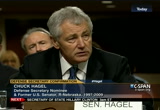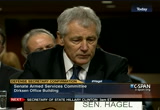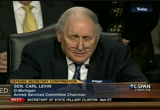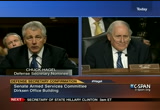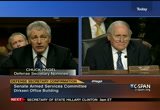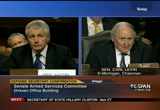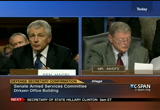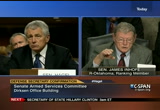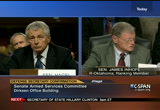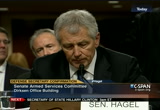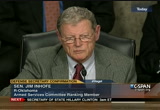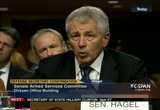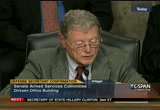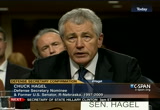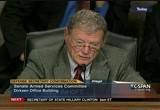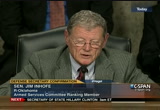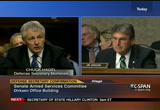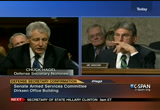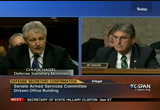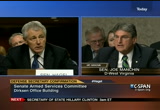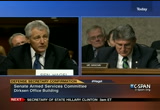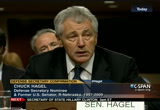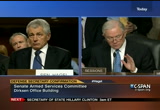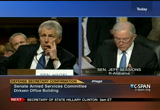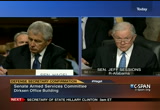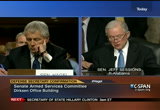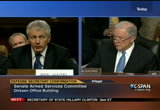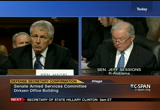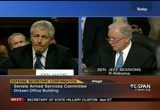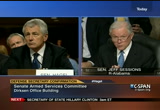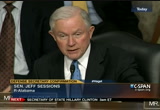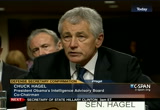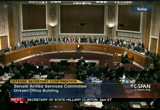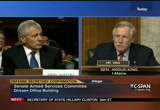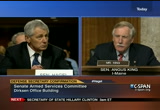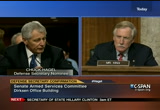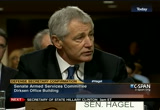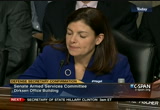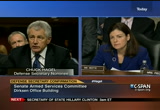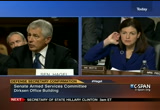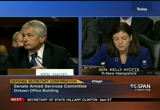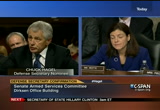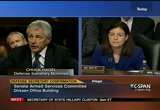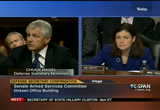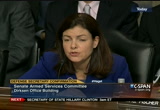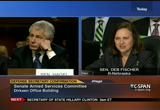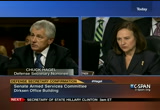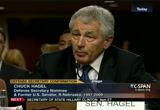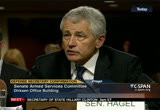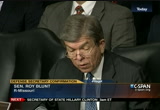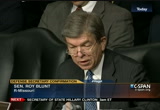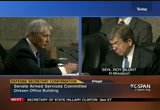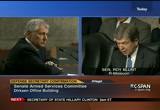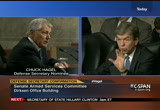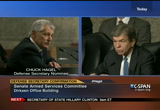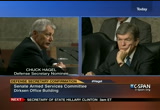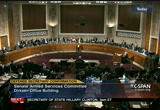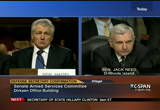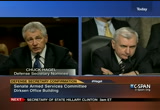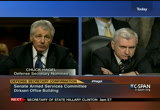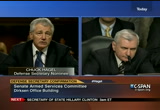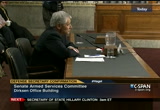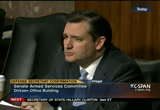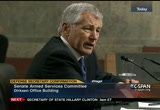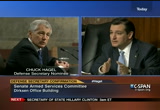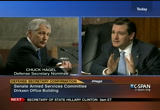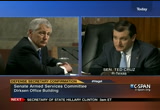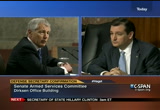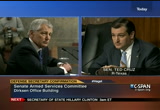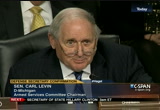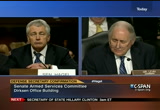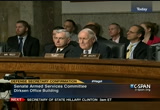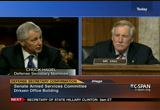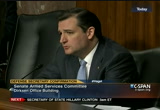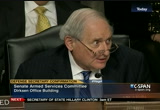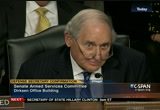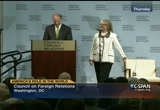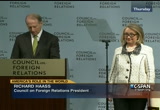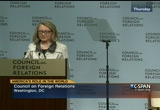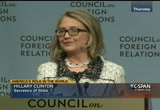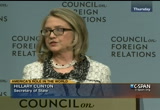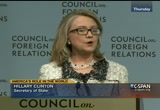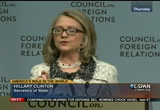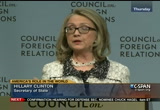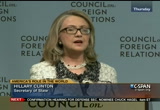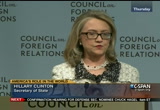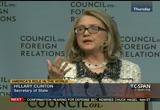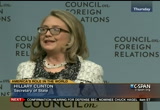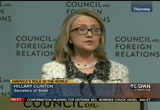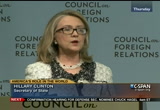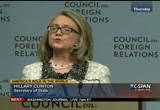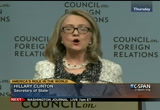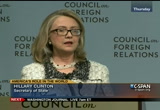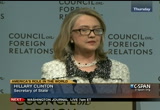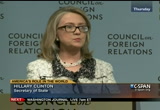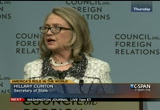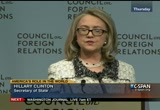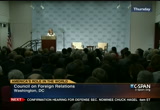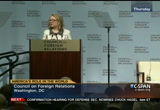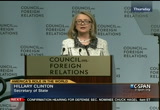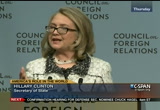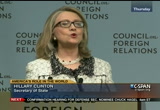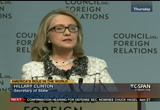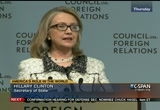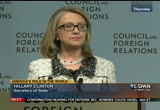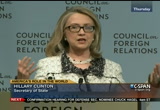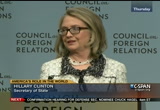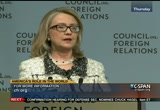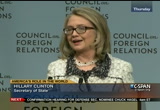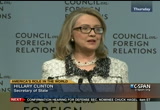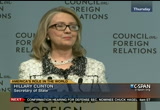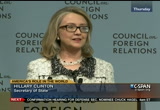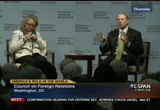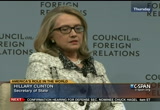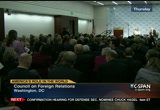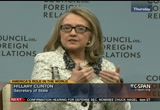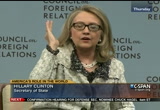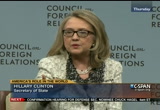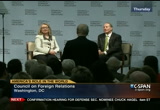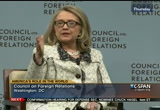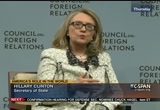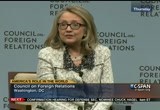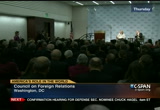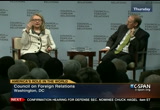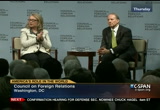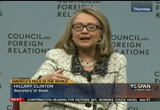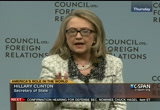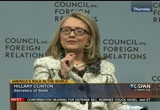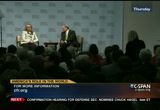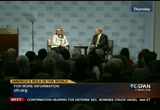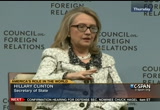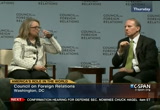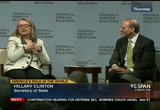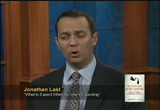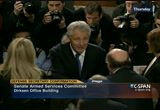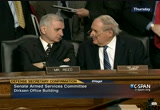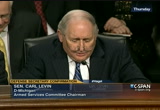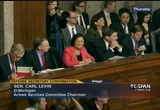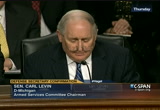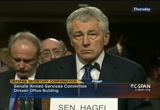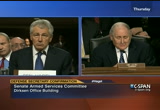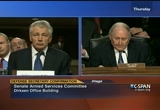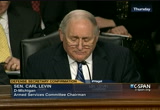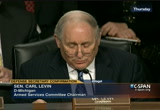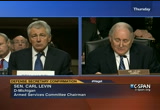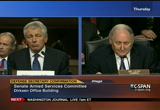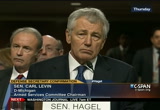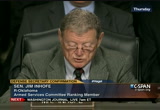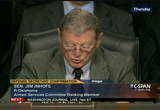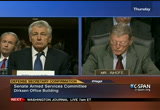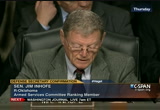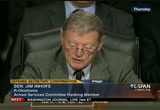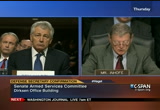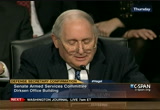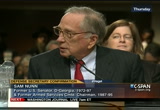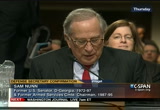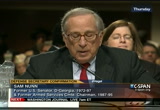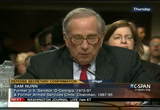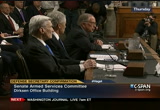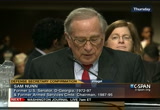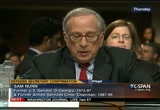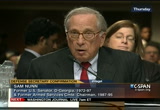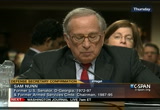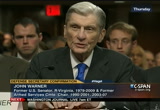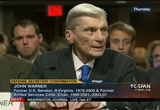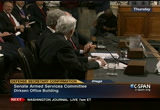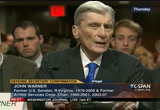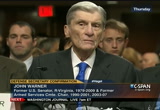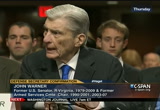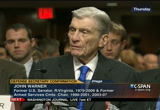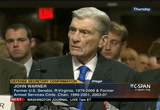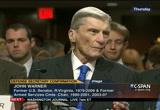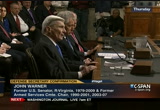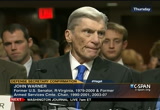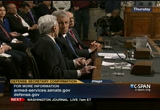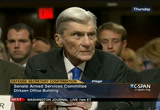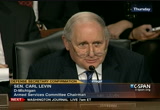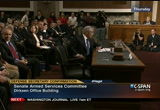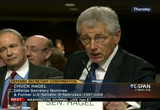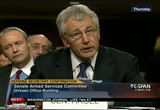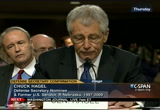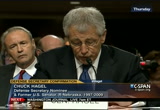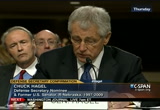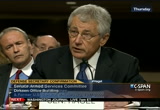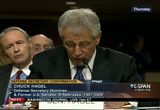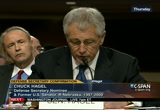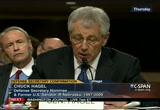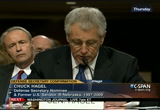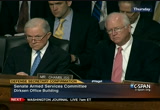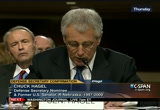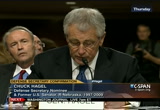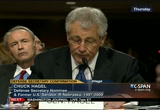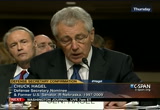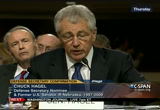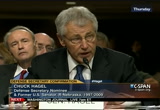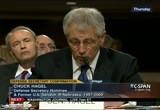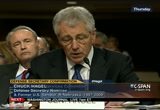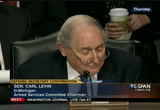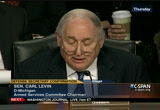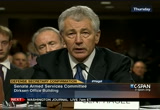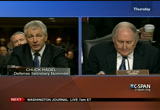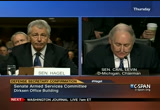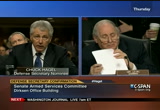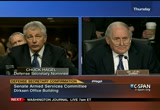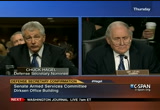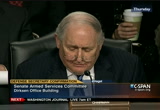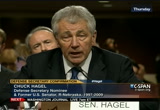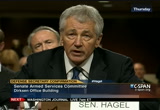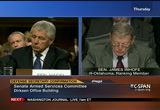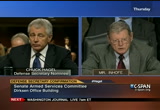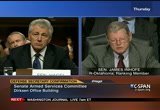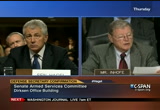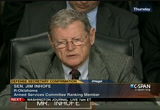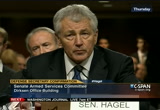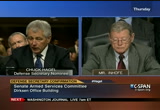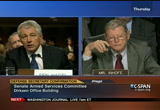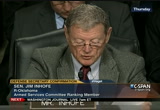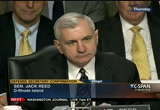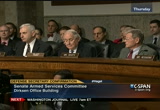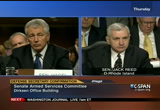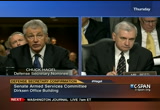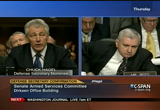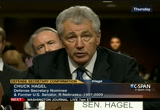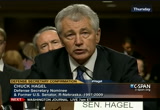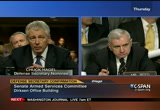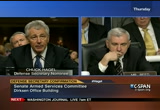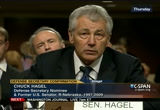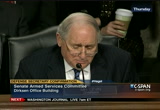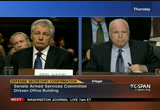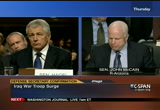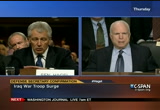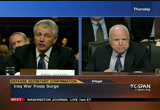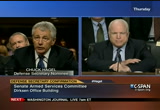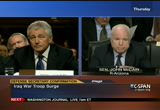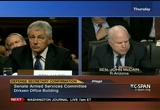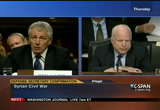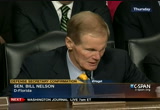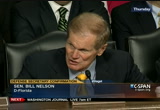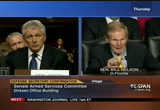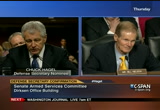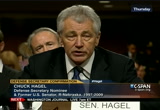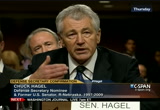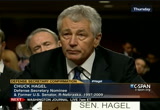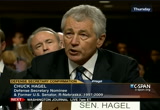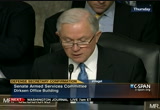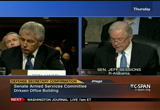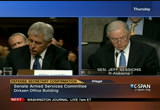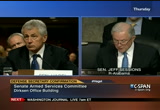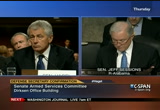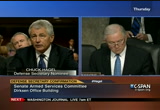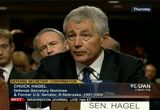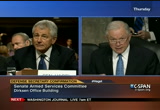tv Capitol Hill Hearings CSPAN February 1, 2013 1:00am-6:00am EST
1:00 am
a lot of people have grievances but not a justification for terrorism and killing innocent people. never. >> are >> are they on par with the grievances that israelis have when they become victims of violent acts? >> i don't think you can judge whether it is the israelis or palestinians or anybody in the world in separating innocent victims of terrorism. >> i think you can in some circumstances, can you? >> not victims. >> must you not judge when it comes to one group of people who may at least be willing to recognize the other group of people's right to exist? >> absolutely. clearly on the record on that point. in fact, in 2006, the anti- palestinian act that i voted for. and there were a number of other resolutions, acts, votes, speeches that i wrote.
1:01 am
in my book, i have said specifically that hezbollah must renounce terrorism and accept israel to exist as a jewish homeland, respect the borders and protect the borders. i made that clear. >> ok. later on in the same speech, you keded the question -- you lasas -- referred to the fact that we really need to develop peace in the middle east. and you ask the question who guarantees this piece? if we expect israel to pull back to their pre-1967 borders, who guarantees that peace? does this reflect sentiment on your part that that is a legitimate way of solving the peace process, bringing about peace in the middle east, by asking israel to withdraw to its
1:02 am
pre-1967 borders? >> no, not at all. what i said was who guarantees the security of israel's borders? israel's borders must be secure. that is part of the fundamental of the core principles of 2006. in fact, you made resolutions that is paramount, the guarantee of the security of israel and its borders. >> i've understand that part of the question of how we bring that peace. but another part of the questions started from the premise that israel would be withdrawing to its pre-1967 borders. you feel that is a tenable solution? do believe such borders are militarily defensible? >> i think that it's all negotiable. the quartet principles of 2006, which president bush laid down in the two-state solution, all of those issues have to be resolved. land for peace, trading land,
1:03 am
all of those are final status issues that are key to the future of israel or before israel can agree to anything. >> so you're saying you might describe a resolution of this crisis involving withdrawal to the pre-1967 borders as perhaps one among several tenable solutions? >> as part of what has been talked about and defined, as i said the main the 2006 quartet principles and u.s. resolutions -- u.n. resolutions that that is part of a final status set of issues that have to be resolved. the united states, no other country can impose that on israel. that is a negotiable issue. but it has been out there. that remains to be dealt with in negotiations. >> is it one that you think the united states should encourage? >> i would encourage peace and a secure, safe israel.
1:04 am
that is what i think most of this would want to see. >> ok. in 2009, you made a statement suggesting that u.s. ground troops should be sent to that part of the world and installed as u.n. peacekeepers in a "non- militarize palestinian state." is that appropriate? >> i don't have the facts in front of me, but i don't think that that was earmarked -- a recommendation was making. as i recall my comments and you may be able to give me exactly the comments, they were in the context of how do you secure israel's border? who secures israel's border?
1:05 am
it has been suggested that this is a peacekeeping role for nato. that is what that was all about. >> my time has expired. i would like to ask you one more question. i understand you made a statement indicating that there is no justification for palestinian suicide bombers. but that there's also no justification for israel to "keep palestinians caged up like animals." did you say that and, if so, do you stand by that today? >> well, i said it. and remember the context for when i said it. >> do you believe today that israel keeps palestinians caged up like animals? >> if i had an opportunity to edit that, i would like to go back. i said many things over many years. it was a larger context. the frustration and what is
1:06 am
happening that is not in israel's interest, to find ways to find peace and security to israel. if i had a chance to go back and edit it, i would. i regret having used those words. >> thank you. >> senator lee. senator kane. >> it was good to see with my dear friend senator warner, a decorated navy and marine veteran from world war ii and korean war, a longtime member of this committee. it was good to see him here. he exemplifies and forgive my va centers and for a minute, he exemplifies something that is very important commonwealth. yorktown, appomattox, the pentagon where 9/11 occurred --
1:07 am
there is a ceremony tonight i will be commissioned in -- there is a commission in april. we care very deeply about these events. one in nine virginians birth to death is a veteran. when you add in the guard and reserve and contractors, now you are probably talking about one in three of us. we care very deeply about all that is within dod. let me be plain, the threat that virginians and others are talking about now more than ever is the inability of congress to find a way forward on a reasonable budget compromise. that is what is in the newspapers and the headlines. at the direction of the deputy
1:08 am
director, dod is planning for future cuts. i am very worried at the macro level about dod's ability to pursue and execute appropriate national security objectives in this time of congressional inability to find a budget compromise. the current cr limits flexibility, for example, of the military to appropriately taylor resources, we have no flexibility to deal with a shortfall. and to me, it seems like funding the military through cr is poor business, poor budgeting, poor governance. i am worried about its effect on the morale of our men and women in service. my first question is a simple one. do you agree that we, congress, must finish a fiscal year 2013 appropriations process as soon as possible to allow dod to move
1:09 am
forward with this year's funding decisions rather than continuing to be down by a fiscal year 2012 cr? >> yes, i do. i think i have been pretty clear on that all day today. you have described it accurately. >> my second question is about sequestration. to me, the new guy, allowing budget sequestration, the cavalier discussions in newspapers recently that i have seen by members of congress about the fact that is reality and we probably cannot change it makes no sense. i am interested to see whether it might be more sensible to realign the deadlines, a sequester deadline. based on a vote we just had and the senate, we are now in a budgetary process where there is a strong likelihood we will be able to produce budgets together with the house. and why would we be making short-term, one-off decisions that are holdovers from a previous congress that could not get it right?
1:10 am
to my way of thinking, that is the way you ought to make budget decisions and revenue accord, rather than through gimmicks like sequestered. i think we will get out of this budget uncertainty, but when we do, you will have the task, if confirmed, of being the secretary of defense in a resource constrained environment and will have to deal in a more thoughtful budgetary process with congress about how to make priorities on spending. i would like to hear you talk about how you would approach that administrative task of dealing with these fiscal realities. >> first, as i noted in my opening statement, if confirmed, i would intend to make this relationship between the secretary of defense and congress a partnership, much as secretary panetta has done
1:11 am
i think it is critically important. you authorize. you appropriate. the federal government is captive to that authorization and appropriation. each department must work in the budgetary framework of those resources. i have said that like all of these big issues, it is a matter of first of all, clearly defining the mission in its entirety as to what is the mission of the department of the department of defense. and then what our priorities are as they fit into our strategic interests around the world. and then how you manage it, how you lead. that includes working closely with the chiefs. it includes working closely with all of the leadership within the
1:12 am
department of defense. it is about teams, people. it is about building consensus within the congress as well as within the military. each military chief has a responsibility for his or her area and service. and that is as it should be. and obviously, goldwater nichols integrated our services, which was the right thing. i think most people agree with that. but also, the commandant of the marine corps and each chief has the responsibility to look out for the interest of our service. the coordination of those efforts engender standing of the bigger picture are critically important. those are all critical elements not unlike you as a governor and one time would bring to the job. >> switching gears for a moment, it is hard to contemplate that if confirmed, he would be the first in last person to hold the position. i want to ask a question about
1:13 am
our listings. senator manchin mentioned earlier the high unemployment rate of our military officers. when we see an unemployment rate among enlisted as that is higher than the national rate, when they have technical skills that can benefit a civilian work force, we know something is wrong. there have been some pilot projects in 2012 and into 2013 to focus on issues that matter. we have talked about it, how to credential active duty military while they are in their mos's how to gain critical skills so that when they leave they are not just a ghani sargent, which people in the average work force may not understand. are you committed to pushing forward on those pilot programs and expanding them so we can get at this employment issue?
1:14 am
>> absolutely, and again, i noted that in my opening statement. i am committed to that. nothing is more important than our men and women and their families, and that does not just mean throughout their time of service to our country, but afterward. we must fulfill our commitment to them. >> one last question. as the topics have come up today when we have talked about iran and the threat of a nuclear iran, we often talk about it as linked to israel as posing security, which is. they are holocaust deniers and they threaten the security of israel. it is not just about the security of israel. the iranian nuclear threat is a much bigger one. it is clear that if they get nuclear weapons, other nations
1:15 am
will start to do the same. i know that is counter to principles that you hold, that the president holds, and is not just on israel's shoulders to be worried about a nuclear iran. it is a threat we all need to be worried about. >> i agree. to add one point on that, you all know, of course, and many of us have been involved over the years -- the current p-5 plus one engagement, to get all five members of the u.n. security council together on this one issue -- we have variations of exactly what should be done, but that should give the world some indication of how russia, china, the u.s., and essentially all major nations of the world to view the threat of a nuclear >> thank you, senator, for being here.
1:16 am
and thank you for your military service. my single biggest concern about the nomination is the dramatic flip-flops between your past statements and record and what you are saying as a nominee. and they are about key, core issues. we have discussed some of those today. i want to focus on that, and i apologize if i go over some of the things that have come up before. i could not be here for most of the hearing. in 2006, when israel was responding to attacks by hezbollah from lebanon, you call that response, "a sickening slaughter." and you accuse israel of "the systematic destruction of an american friend, the people of
1:17 am
and country of lebanon." what do you say about those statements?>> well, first, i said them. i have been asked about them. i have said that i regret saying that. it was within the larger context of a speech i made about what was going on, a thirtysomething days of war going on. i also included in that speech the responsibility of hezbollah, who started the war. it was not exactly the way you just noted it. the language is exact, what you just said, but there was a larger context. yes, i regret that language, but i think the bigger point, senator, and i have noted is all morning, my unequivocal support
1:18 am
of israel over the years, there has been no flip-flop on that. i have never voted against anything but israel's interests in every vote i cast in the u.s. senate. i have said it in my book. there are a special, historic ally and we will always support and defend them. i have said it in my speeches. there is no flip-flop on support of israel. >> is there a flip-flop on your calling the -- do you stand by your statement about hezbollah? >> i just said that i regretted it. >> do you stand by those words, or do you flip-flop? >> if i had a chance to edit, i would. >> that is what i'm talking about in terms of flip-flop. >> if i had a chance to edit a lot of things in my life, i would probably be fairly busy. >> let me move on. a number of these concerns in 1998 in a senate hearing, you said that secretary of state madeleine albright had "tilted
1:19 am
way too far toward israel in the middle east peace process." do you still think that of the peace process in 1998? >> i do not recall the event, the words. i do not know where that comes from or the context. again, senator, i go back years and years on different things i have said, but i do not recall what that context was, so i do not know. secretary albright has endorsed me, by the way, to be the next secretary of defense. i work very closely with secretary albright, as i do with the clinton administration in support of israel. >> in general at that time under the clinton administration, the you think that they were "and going way too far toward israel in the middle east peace process"? >> no, i do not, because i was very supportive of what the president did at the end of his term.
1:20 am
in january of 2001, in fact, i recount that in my book. >> just to clarify, that is the sort of flip-flopper but i am talking about. that is what you said then, and you are changing you -- your mind now. >> that is not a flip-flop. i do not recall everything i have said in the past 25 years. if i could go back and change some of it, i would. but it does not discount the support i have always given israel and continue to give israel. >> and going to what you said today talking about iran as "legitimate elected government" you think that the election of this iranian government coming to power was free, fair, and legitimate? >> i noted the term "legitimate" was not the term i should have used. i should have used recognized. that is the more appropriate term.
1:21 am
i was referring to the fact that it is a nation that is a member of the united nations. it has embassies from all of our allies. it is a recognized nation. >> what about the word elected? you said "legitimate elected government." >> there was an election. you think that is a free and fair and legitimate election? >> that is not what i said. >> you said, "legitimate, elected government. >> i just explained that i should have said recognized instead of legitimate. there was an election and there will be another one in june of this year for the president of iran. whether it is free and fair, i do not know. >> you have no expectations one way or another about that? >> i do know that iran is not exactly a model democracy. and it has not been.
1:22 am
i do not have any expectations for a free and fair election. >> in 2008, you wrote that a nuclear iran might be tolerable because "sovereign nation states possessing nuclear weapons capability as opposed to stateless terrorist groups will often responds with some degree ne responsible or at least, sa e behavior." is that still your hope or expectation about the government of iran?-- sane behavior." is that still your hope or expectation about the government of iran? >> i'm not sure where the reference came from or the context. but what i was referring to was the different options that people will look at in regard to
1:23 am
iran getting nuclear weapons. i have always said that iran must not get weapons of mass destruction. i have always said it is a sponsor of terrorism. i have always said the military option should remain on the table to assure that iran does not get to their weapons. -- nuclear weapons. >> in this statement you suggest that iran would maybe or hopefully respond in a responsible, or at least sane way. is that still your expectation of hope? >> i always hope that people will respond in a sane way. but that does not change the fact that it is a dangerous country to the united states and the entire world. >> after your statement, the iranian press noted with satisfaction that "anti-israel hagel" and that is there a statement, not yours, why do you
1:24 am
think they have that impression? >> first, it is not an accurate quote. >> it is an accurate quotationof of the iranian press. >> it is not an accurate statement of my position. >> right, but why you think they have that impression? >> as i said earlier, have enough difficulty understanding american politics. i surely do not understand iranian politics. but if i might add, i also said there have been some rather significant israeli government leaders who said some pretty nice things about me, current israeli leaders. >> ok, thank you. >> senator king. >> like all of the other
1:25 am
today, i want to thank you for your service and particularly your willingness to put yourself through this process to serve your country once again. it is one of my life principles to never take a job where i would have to be confirmed by legislative body. [laughter] and you are doing it. i read one commentator that said, the fact that this guy was an enlisted man in vietnam is nice, but not significant. i think it is very significant. i am a bit of a student of the cuban missile crisis, the most dangerous moment this country has ever experienced. anyone who studies that time, it is hard to escape the conclusion that president kennedy's servers on the front lines in world war ii and chairman kershaw of's service during world war ii was of significance, their willingness to back away. most of the questions, probably 90% today have been about policy.
1:26 am
but the reality is, policy comes from the president. you will certainly advise, but that is where policy comes from. i would like to ask your thoughts about management. you are about to take on the world's most cumbersome bureaucracy with a lot of headaches and problems and the budgetary challenges. share your thoughts with me about how you approach the management of the department of defense. >> senator, thank you. i note you were sitting there during the exchange i had with senator kaine about some of the -- some of this. in answer to your question, i would pick up on a couple of those observations.
1:27 am
first, i know you were also a governor. you both understand a lot of the pieces of this. no matter how big an organization is, there are still some fundamentals to leadership and management. as you have noted, the department of defense is the largest institution, certainly, in this country, and maybe the world. how do you try to manage your wealth? it is not about me. the secretary of defense, he leads, he advises the president, but it is really about -- the people who run the defense apparatus. that includes all of the officers. i think there are over 50 presidential appointees in the department of defense. obviously, there are uniformed military, 1.3 million of them. all of these people are required
1:28 am
to manage the department. i think fundamental to me, and then answered your question, it is accountability. we have had some discussions today about audits. all institutions must be accountable. elected officials are accountable. we are all accountable. and the emphasis on accountability i do not think could ever be overstated. you give managers flexibility, resources, but you give them direction and expectations. they have to be very clear, direct, and defined. but not to the point where you do not want their input and their ability to be flexible with their management. in my opinion, that is the key to anything, but surely it is the key to something as large as the department of defense. a number of questions were asked of me today about specific programs, submarine programs, different areas of technology
1:29 am
and acquisitions, and our superior technology. i said i do not know enough about it. i do not. there are many things i do not know about. if confirmed, i intend to know a lot more than i do. i will have to. but at the same time, i would never think that, as i said earlier, this is about me or that i will be running anything. i will be the leader. i will be responsible. i will be accountable, but i've got to rely on the right teams, right people to bring those to get there. it is accountability and responsibility. i would stop there, if they give you some sense of how i would intend to do this business. >> my theory of leadership is to hire good people and take credit for what they do. >> [laughter] >> you are a guy from nebraska and in the army, so i imagine you do not get up in the morning and think about the navy. i hope to correct that in the next few years, particularly in maine and other parts of the
1:30 am
country. there's a multi-year procurement program that is in jeopardy because of the budget situation. your feelings about multi-year procurement and maintaining the industrial base, which we just have to do if we will be able to maintain our force? >> governor, you probably know, and gov. kaine probably knows as well that there is such a thing as in nebraska navy. our governors make these distinguished appointments throughout their careers. our fleet is small, but mighty. that has been my early experience with the navy. the industrial base, a reference that with a couple of other comments i made earlier today in responding to questions. absolutely essential to our future that we maintain a strong, growing, credible
1:31 am
military industrial base. for all the reasons that you understand. the survey, senator mccain does, being from virginia, -- certainly, senator kaine does being from virginia, as well as several others. how we prioritize our needs, how we account for an audit contracts, forward procurements, cost overruns, waste, fraud, and abuse -- all part of it. this will be more and more essential as we are dealing with, as you have noted, a restricted budget. maybe very restricted budget, depending on how things happen on sequestration. the navy is an indispensable part of our security apparatus. first commodity is the one visible projection of power --
1:32 am
first, it is the one visible projection of power that we have in the world. obviously, our rebalancing of resources in the asia-pacific region is some indication of that. persian gulf, we have been talking all day about iran, israel. but iran in the persian gulf. we have two battle groups in and out of that small area. the flexibility, agility, missile defense, nuclear, all of those capabilities are within the navy. i am a strong supporter of advancing our navy technology and our efforts, and i will continue to do that if confirmed. >> thank you, senator. i will have more questions at a later time. >> senator shaheen. >> thank you, mr. chairman. senator hagel, thank you for your tremendous service in
1:33 am
europe provided to this country and your willingness to take on this challenge as secretary of defense, and for your stamina at this hearing all day. you will certainly need it as secretary of defense. i want to follow up on senator kean pose a question about the navy. it is very important to us in new hampshire as well. our four public shipyards are the backbone of our naval power. but according to the navy, there is a huge backlog of restoration and modernization projects at our shipyards. according to last year's number, the backlog was around $3 billion at portsmouth naval shipyard, which we are all concerned about. that number was $513 million.
1:34 am
it is not cost-effective. for example, the 2010 gop report pointed out that the pure project at northrop, which i'm sure senator mccain -- kaine is familiar with, if it had been addressed earlier, it would have cost much less. in fiscal year 2012, senator collins and i included an amendment in a bill that requires the shipyard modernization plan to address these shortfalls. the report is laid, but was promised in the upcoming budget submissions for fiscal year 2014 prepare will you commit to ensuring this modernization plan is produced? and would you commit to pressing the navy within the fiscal constraints that i appreciate,
1:35 am
but ensuring that for the long term they continue to be very efficient and effective at our shipyards? >> yes, i will make the commitment to do everything i can to first, understand the specifics, which i do not know all the details. but your request is preliminary to effective, efficient use of our resources, and planning our national security. i will make that commitment. if confirmed, i will get the details. i will assure that the navy responds. >> thank you. and i'm sure others, and -- join with me in inviting you to come to see the shipyards as soon as you are confirmed. >> thank you. >> i know there has been -- a fair amount of discussion today about your involvement
1:36 am
with an organization called global 0 and your position on nuclear weapons. i think it is worth quoting again what senator reid said about ronald reagan, who said that we seek the total elimination one day of nuclear weapons from the face of the earth. i think every president since modeled reagan has supported that aspirational goal, recognizing that at this point in time, it is a goal. certainly, that is what president obama said he supports, that someday -- probably not in this lifetime, but some day we should hope for a world that would be free of nuclear weapons. i have heard you say that you agree with those two statements prepared but do you also agree that as long as nuclear weapons
1:37 am
exist, we have to maintain a safe, secure, and effective nuclear arsenal to deter any adversary? >> yes, completely, absolutely. i have never had any position but that. as i indicated this morning and this afternoon, i will continue to take the position. as i said in my opening statement and an answer to other questions, our nuclear deterrent has probably been the core of keeping world peace and avoiding a world war iii. as long as there is the threat of nuclear weapons, and like you noted and president obama noted in his speech in 2009, it probably will not happen in our lifetime. but just as you noted, and in senator read's comments about what president reagan laid on the cape -- on the table in 1986, we need to
1:38 am
keep working on it and moving forward and tempting to do it. -- attempting to do it. if you look at the different treaties we have done, we have brought those war had done, under republican and democratic administrations, bipartisan. what sam said this morning, he and his former colleagues, secretary kissinger, secretary shultz, secretary perry, hundreds of national leaders in the republican and democratic leaders -- administrations over the years have supported nuclear destruction -- nuclear weapons destruction. not unilateral, bilateral, negotiated, and verifiable. as ronald reagan said, trust but verify. nothing unilateral. >> thank you. another has been a lot of discussion about your comments relative to sanctions on iran and various options we might pursue with respect to iran and
1:39 am
nuclear weapons. i wonder, again, if you would confirm what your position is on the president's current strategy of strong diplomacy, a tough international sanctions, and keeping all the options on the table. >> you have just defined president obama's strategy on iran, which i firmly support. it is the wise way to do it. i do not know if i mention this to you in our meeting, but i wrote a book in 2008 and i have a chapter on iran. i laid out all out in the chapter, as i have said. i do not think president obama went to my chapter and about his strategy on my chapter, but there is nothing in najaf during -- in there
1:40 am
during the house that i have never said that deviates from where the president is the military option -- from where the president is. the military option should always be on the table. it always should be the last option. aren't we wiser if we can accomplish our objectives without having to go to war? for everybody. >> i hope so. you referenced meeting we had last week, and i appreciated your coming in and talking about some of the statements that had been represented and that you have addressed today. one of those had to do with israel's security. again, i of this has been discussed at length during the day today. i wonder if again, you could reconfirm what your commitment is on israel and the security of israel in the middle east. >> my support of israel's security is and always has been very clear. i strongly support israel. the security of israel is a commitment that we made to
1:41 am
israel in 1948 when israel was born under american leadership. harry truman. that commitment was -- is a bond that is more than just allied to outside. -- more than ally to ally. it is special, historical. i have never equivocated from bat line. i have said this in my book. absolutely we will continue to do that. >> thank you very much. >> we are going to have a five- minute second round. and if we need a third round, we will have a third round. i will try to take less than five minutes, so i can yield a couple of minutes if i still
1:42 am
have them to center in off. earlier today, one of my colleagues made a statement i you had not responded to requests for copies of all of your speeches and to a request about contributions to certain organizations, i believe, the u.s. either served or spoken to. you did not have the opportunity that you either serve or spoken to. you did not have the opportunity to respond to that time. if you wish, you may respond for the record. >> mr. chairman, thank you. i will respond for the record. as far as i know, and i asked at the break of our counsel, we have responded to all requests, or are in the process of responding to every single request.
1:43 am
some of these requests and did not come in until yesterday, specifically the financial documentation request, copies of my speeches came in late. we have given the committee every copy of every speech that i have that is out there. every video that i have that is out there. on paid speeches, most everyone of those paid speeches, in the contract is says that they are private and not videotaped. it was not my decision. that was the contract of the group i spoke to. i believe every paid speech i gave i did not howff a prepared text. -- i did not have a prepared te xt. i gave it extemporaneously, which is something i have been doing since long before i left
1:44 am
the senate. we are filling every legal commitment. i have complied with every ethical request. i always have. i did when i was in the senate. i will continue to do with now. we are doing it now there were one or two times when you did not have the opportunity to reply to a question. in order to not use all my time, you should feel free to do that for the record. we will keep this record open until close of business tomorrow for questions. and for your answers, close of business monday. which means 5:00 p.m. tomorrow for questions for the record, 5:00 p.m. on monday for your responses to questions for the record. at that time, would you give us the update on any additional documents, speeches, or information that you have been requested to provide that you have not yet been able to buy is in the works? >> i will, and i have committed and will continue to commit to
1:45 am
complying with every legal document, a legal requirement. >> thank you. i hope i have a minute or two to yield. >> i will have to hurry this up a little bit. it is less time than i thought we had. it was mentioned that one of the members of your thought i was being disrespectful during the time i was questioning you. it was at the time that i made the statement that you have been endorsed by the ministry of iran for your nomination to be secretary of defense. do you consider that to be it disrespectful motion on my part? >> no, it is a legitimate question. >> thank you. i have been a leader on postponing any further abrams
1:46 am
f-16's to egypt until the government is under control this is the representing my thoughts. y.think moorsi is an enem the army is a friend. there was a vote a little while ago to do away permanently with the sending of any of this equipment to egypt. i do not think that is a good idea. what i think is a good idea is to continue to use that as leverage. if you do that, you lose the leverage. i believe we will be in a position right now, enda morsi has already distanced himself from the military. that is a good step. i think we could reinstate a friend in that area. i would ask you whether you would agree with my statement i came out with a long time ago, or my bill, i guess i should say, and that i reintroduced in a stronger way today, saying
1:47 am
that we would withhold this equipment sending to egypt until such time as these conditions are met. and i mention the conditions being the accord at camp david and that type of thing. would you consider that? >> that is a policy that the president of the united states would have to consider. if he asked my advice, i would give it to him. but to the bigger question, i think is important that our assistance to egypt be conditional. they play an absolutely critical role in fulfilling the commitment of camp david and the security of israel. >> we are almost out of time right now. i appreciate an answer. you made a statement that i strongly disagree with. you said the president of obama has been the strongest israeli supporter since 1948. i have a hard time with that. i know he is not up for confirmation.
1:48 am
you are. but when you see statements coming out of the administration like the united states believes that negotiations should result in two states with permanent palestinian borders with israel, jordan, and egypt, and they've come out with statements saying they believe that the borders with israel and palestine should be based on a 1967 border lines, these are statements that i think are very damaging. i can assure you that the leadership in israel feels those statements are damaging. do you still feel this president has been the strongest supporter of israel since 1948? >> i do, and i will tell you quickly why. first, the 2006 quartet principles that president bush laid down coverage most of the points that you have made. i supported president bush then, and still do in what he did in developing those principles. when you look at the assistance this administration has given to
1:49 am
israel, the most significant and largest military to military exercise and challenge to the israeli u.s. forces last fall, the money we put into the iron dome, the president's position of "we've got your back." >> that is fine. i appreciate it. one other thing before run out of time, something you are interested in. you were a co-sponsor of the defense act of 1999, and i was, too. we agreed then. times have changed since then. at that time, people thought having the capabilities was confined to the u.s.s.r. at that time, or russia, and the united states. a lot has happened since then. at one of the things i disagree with most in the first budget that the president had --
1:50 am
this president had is when he did away with the ground-based interceptor site in poland. most people agree that we still have adequate protection on the west coast. it is the east coast, and our intelligence still says today, that iran will have the weapons capability and the delivery capability by 2015. that is why it was supposed to be there. now there is a discussion saying, to cover the boy, we -- cover that point, we need to have a third site. do you support that? >> i am aware of the authorization and instruction for a third site in the environmental impact statement. i do not know enough of the details.
1:51 am
if confirmed, i will get into it. but to respond to that, which i will for the record, i just do not know enough about it. >> i think is very significant and i think most people are looking at this with a void. you have a timeframe between now to 2015. nobody disputes the capability that they will house in that -- have in that time. it is not been classified. there is still a void of the six years between what we have in capability and what needs to be in place. i hope you'll come back and support the third site. the last thing, if you'll forgive me, mr. chairman, when the senator talk to you about your efforts in choosing and her expectations on your being involved in using the department of defense for all of these environmental things, i would
1:52 am
suggest you that is why we have a department of energy. and when i ask you a question, would refrain from doing the things that have been done in the past in his administration, such as forcing the navy to pay $26 per gallon for 450,000 gallons of fuel that you can buy for $3 and other things, it is billions of dollars that we are paying that we could be using for war fighting. i see an inconsistency in your answer to me, and in your answer to the senator from hawaii. >> my answer to the senator from hawaii, and i believe you can read it back, was that i am committed to all of the efficiencies we can find in the department of defense that are in the interest of our country. i did not commit to any one program. >> or any program that would be a costly program on experimentation, such as these programs i just mentioned. clearly, they are in the jurisdiction of the department of energy and they are the ones
1:53 am
who is supposed to be doing it. don't you agree that we should confine ourselves to enhancing our war fighter capabilities? >> well, of course, but within that round, certainly, the kind of money that we spend on fuel, as you noted, that should include some sense of that, but also whether there are other things we can do within research and technology inside the department of defense. it just makes sense. >> we should come as a government, but that is what the department of energy should be doing. when you suggest a high cost of fuel, yes, it is a high cost because we are paying 10 times as much as we would have to pay, money that we could be putting toward our were fighting efforts. that is my point. >> yes, i agree, but why would we not look all options if we have the kind of sophisticated research and technology that the department of defense does and
1:54 am
how -- has possession of? i do not know anything more specific to or central to our security than energy. >> i know my time is expired, but we are spending literally millions, actually some billions of dollars, on some of these experimentations that again are not in the purview of this. right now, we are installing 139 f-35's that we just recently put off. if they put them off indefinitely, that is just a cut. those are things we should be doing right now. we are looking at the ohio class of. we should be doing that right now. if we are spending and the environmental causes on war fighting, apparently, you do not agree with that. >> i will commit this to you, senator. as i said to the senator from hawaii, if i'm confirmed, i will
1:55 am
look at all of these programs. i will have to. >> thank you. senator manchin. >> i feel like i want to apologize for some of the tone and demeanor today. with that being said, if i could ask you this, since we are so -- again, talking about things you have done and said over the years -- how did you get to vietnam? were you ordered to go to vietnam? were you sent there? how were your orders? >> well, actually, i got to vietnam through kind of an interesting route. i volunteered for the draft. as my brother did a month after me. during that time in 1967, the draft was coming down with pretty heavy levy, as you recall. >> i was there. >> and i know your story. they would not take you, not
1:56 am
because you were not smart enough, of course, but because of your knees. you tried to bribe your way in, but they still will not let you. i admire your effort. and i know your story. i went to basic training, advanced infantry training. my brother followed me everywhere a month after me. after advanced infantry training, i was selected to be one of nine first-class then top-secret shoulder fired heat seeking a so-called "the red eye gun." at the time, it was classified and it was built to bring down low-flying soviet-made -- soviet migs flying over germany. we spent two months training. it was all classified. we could not get calls in a
1:57 am
route. all nine of us were quietly ordered to go and were integrated into nato units without any fanfare or anyone knowing about it. i got my orders to go to germany. i went to fort dix, new jersey in november, 1967. my eight fellow soldiers and i were getting packed up to go to germany. i just decided, if i was going to be in the military, it did not make much sense to go to germany. i had never been to germany. my great grandparents are from germany. probably a pretty good place, i thought, but i ought to go where there is a war. i took my orders down, told him i was private hagel and here
1:58 am
were my orders and i was told to go to germany and i wanted to go to vietnam. the office was a bit quiet. they brought in priests, rabbis, ministers, psychiatrists. they all came in to examine me, thinking something was wrong. i was running away from something or i had killed somebody. after two days of testing need to see that i was ok, they held me. i scrubbed the barracks for five days before they could cut new orders. they gave me new orders to go to vietnam. they sent me home for five days and then on to travis air force base in san francisco. i got to vietnam in december, 1967. >> there is no reason anyone of us should ever be concerned about your willingness to do anything you possibly can to defend this country against all foreign enemies, wherever they may be. >> well, i hope not. we can disagree on policy.
1:59 am
but i think my life and my commitment to this country is pretty clear. i am proud of it. >> and i would say that israel, the spokespeople for israel support you. they have come to me and told me that. have they told you that? >> there are many israeli groups that have formally supported me. i'm grateful. >> and it sounds like iran has wishful thinking. >> evidently, iran supports me. >> the president has asked you to serve at this level, so he >> the president did ask me to serve. i said in my opening statement i am grateful that and honored by -- by the trust and confidence and will do everything in my power never to do anything that would disabuse that confidence from this country. >> as you see the role of secretary of defense, and i know we have talked about it and you have been question on policy, and i know you will not
2:00 am
be in a policy position. you will be basically following policy, not making policy. but if you could wrap it up, what we should expect from your position as secretary of defense -- >> thank you. if i am confirmed, as i noted in my opening comments, i would see this relationship as a partnership. i will need your help. i will need your advice and collaboration. many people on this authorization committee have a great deal of experience in this business. many far more than i do, as is the case in the congress, both the senate and house. i will need that. i will call upon that. i will not be in a policymaking position, as you know. i have also committed to all of you, and all of you who have served with me know this, i will always be honest with you. you never have to worry about
2:01 am
that. i will listen to you. i'm sure we will not always agreed. but i will say it straight and i will give you and the president my honest, most informed advice, always. >> thank you. and i will say one more thing. where i come from there is an old saying that goes, i cannot change your mind, you cannot change anything. -- if you cannot change your mind, you cannot change anything. >> senator hagel, you are holding up well. but it is an important office and you have asked to meet our defense department. i know you know the seriousness of that and is exceedingly important. you have to know, and in particular recent years there has been tension within the congress over a number of issues, one of them is national defence. that is a subcommittee i am a
2:02 am
member of and we have wrestled with that over the years. and we have pretty consistently had a bipartisan congressional vote on those issues. we have voted again this year unanimously on the armed services defense authorization bill. unanimous out of committee under chairman of an's committee, and senator mccain. i was looking today at the national journal. the obama administration is moving to begin new u.s.-russia talks on the drawdown of the nation's nuclear arsenals. that has also been an issue of concern. but i believe we have been staying fairly bipartisan and unified on that. your report is what causes a great deal of concern. this study of the global 0 group. i would note that vice president biden is set to meet with the russian foreign minister this weekend during the
2:03 am
munich security conference. national security adviser tom bolon will have to moscow in february. -- tom donelon will go to moscow in february. and the president will begin to call for the deployment of strategic nuclear arsenals involving 700 delivery systems. as i read the global 0 report that you co-authored less than a year ago, you call for the elimination of all icbm's, all tactical nuclear weapons, most of the bombers, 67 b-52's @ eliminated, leaving only 80 bombers and submarines. it looks like you are down to about 28 delivery systems.
2:04 am
this is of dramatic concern. there are worries on capitol hill that the administration could revise its missile shield strategy, or go ahead with cutbacks to the u.s. stockpile as a means to draw russia into negotiations, foreign policy magazine reported, ahead of the unannounced discussions. the house subcommittee chairman mike rogers asks if they have assurances as to what is going on there. i would note that last year's defense authorization villepin -- bill calls for briefings on his discussions to the congress, the servant -- the armed services committee and subcommittee.
2:05 am
it does not less than twice each year, the president or his designee will brief the committee on foreign relations and the committee on armed services about the dialogue between the u.s. and the russian federation on issues of limits or controls of nuclear arms, missile defense system, and long-range conventional strike systems. the deadline for that would be march 2 this year. my first question to you, if confirmed, will you honor that request as part of the mdaa? >> the request for the briefing? >> yes, the requirements for the briefing. will you keep congress advise on any discussions dealing with national defense and dialogue with russia on national missile
2:06 am
defense and nuclear arms, and long-range conventional strike systems? >> yes, i commit to do that. >> also, it is the sense of the congress that any agreement between the united states and the russian federation dealing with nuclear arms or missile defense systems or long-range conventional strike systems obligating the u.s. to reduce our armed forces or armaments of the united states in any militarily significant manner may be made only pursuant to the treaty making power of the president, as set forth in article 2, section 2, clause 2 of the united states constitution. it is the sense of our congress said any significant alteration of those deeply important relations between our two
2:07 am
nations, the two most powerful nuclear nations in the world, would be done by treaty. they said "maintained the >> will i commit to a briefing on all of this? >> any significant changes that would occur in our relationship on those issues, a significant military matter may be made only pursuant to the treaty making powers of the president. we would ask that that be presented to this congress because we have treaties
2:08 am
already that impact so much this. congress believes that any changes should also be made by treaty. >> without getting into specifics, let me commit to a cop is a consultation with the congress, with a authorizing committee, yes. >> it seems like we have not been consulted on the client representative and the donelan trap. we expect that to be done. what is going on is disturbing to us. the president said, we will have more flexibility after the election. he was clearly responding to these issues, missile defense, in particular, and making nuclear issues. he was not consulting with the american people, not telling us or the congress what was planning to do. he was apparently willing to
2:09 am
discuss it with the russian leaders. i am asking you, will you comply with the treaty making matters? if these agreements are significant militarily, i believe they should be done by treaty and not viper a personal agreement between our two leaders. >> i would commit to fulfilling any treaty obligation and any commitments to the congress in any consultations at the congress needs to be a part of, absolutely. >> i am not sure that answers the question. the congress is concerned about these kinds of negotiations. we do not have the president -- he has made clear he believes in zero nuclear weapons. that is his policy for america. i think it is utterly unrealistic.
2:10 am
it is amazing to me. that could lead us into unwise decision making. congress has responsibility to the american people to ensure the national defense treaty we need to know and have you share those negotiations with us and any changes that may impact our security relationship between us and russia. those should be done by treaty as that have been done in the past. >> i have never discussed any specifics of this with the president. i know he knows and believes and is committed to treaties. that is the purview of the united states senate. as the senate passed the new start treaty. all that goes into the negotiation, in this particular case, russia, certainly the congress has to be involved in that. >> that is very important, senator hagel. i have to tell you because there
2:11 am
is unease here that that may not be in the works. there has been some discussion for some time about private unilateral or bilateral negotiations, which congress is not involved in. it impacts the national security of our country. that is why this was passed. we expect you to comply with all that. i take your testimony that you comply. >> i will comply with all laws and requirements, absolutely. >> thank you. senator sessions, senator king? >> center hagel, one of the first meetings i had after i began running for this office last summer was with a group of veterans going from world war ii up through afghanistan. i wanted to share with you one of the ideas that came out of the meeting. it has been touched upon today. that is the issue of employability and implement a
2:12 am
particularly recent veterans. the suggestion was made at the army and military have recruiters, people who bring people in. perhaps it might make sense for them to have a reciprocal of recruiters, out-placement people to deal with soldiers, men and women, for about to leave. there is an information gap, is what the veterans told me, between leaving active duty and then going into the veterans administration jurisdiction. there is a gap. we need to respond. that is a suggestion i might make clear it would be tremendously helpful -- tremendously helpful to try to provide that information, what programs are available, how the gi bill works, all of those things. i am sure it is done to some extent right now. but to regular lies that, to be comparable -- to be comparable to the efforts made in recruiting.
2:13 am
>> thank you, a senator. i will think about that. i have not fought exactly about that potential, but i would say that as we think through, how do we accommodate and fulfill commitments and assessed our veterans -- -- assist our veterans -- i think we need to open up all this new thinking. that is one that would deserve some exploration, and if confirmed, i look forward to pursuing the idea with you. >> i am also serving on the intelligence committee. one of the issues -- you talked about this in your statement. this whole issue of counter- terrorism -- counter-terrorism involves the actions of a number of agencies and bodies of the united states government. i would commend you that i think it deserves real thought as to where the department of defense
2:14 am
stops and the cia began, in terms of action and counter- terrorism action. i think there -- it would be worthwhile, if you are confirmed, to meet with mr. brennan to talk about coordination between the two agencies so do not end up with similar if not identical functions in different regions of the world with different command structures, rules of engagement, etc. -- counter- terrorism covers the gap or the relationship between traditional defense and the intelligence committee. -- community. >> that is an area that is becoming more relevant and complicated. title and reverses title 50. -- title n versus title 50. >> final thought -- but not
2:15 am
think we can adequately assess the size and importance of the cyber threat. that may well be the war of the future. my sense is that we are not -- we are all talking about it, but i am not sure we have a sense of urgency. and the secretary panetta has increased our proposed increase of that capacity. people can die, and their society could be brought to a standstill without our rocket ever taking off or are planned and treating our airspace. i hope that will be a point of emphasis, because i think that maybe the next war. >> i agree. as you know, i noted it in my opening statement. i agree with everything you said. this is a huge issue that continues to loom large over our future and our security.
2:16 am
if confirmed, it will have a lot of my attention. >> in the absence of the chairman, senator ayotte, i believe it is your opportunity. >> thank you, mr. chairman. we all respect your deep service to our country. let me thank you for your inference. we appreciate it. i wanted to ask you about a speech he made in 2007. it was at the center for strategic and international studies. it was a speech entitled unit -- the united states and iran at a dangerous crossroads. in that speech, you, in referring to iran, said, the strategy to containment remains relevant today. i wanted to ask you about that
2:17 am
statement that he made in 2007. that was in 2007. why would you say that? isn't that inconsistent with what you have been saying today with regard to content? >> i do not have the speech in front of me. i think there was more to it than just that. if i recall, the entire speech was about, how do we deal with iran? i think what i referenced was within that inventory, what are the options? cannot think that speech says that i support it. >> no, but he said it was relevant to the discussion with iran. why do think that is a strategy that we should have considered?
2:18 am
it was one of the things you mentioned. >> you can say it was a strategy. >> and not want to be unfair, that you said was that the strategy of containment remains relevant. >> the bigger point is what i was saying -- i have not looked at it recently -- what was the range of options that we would have to look at? and did not advocate it. i did not recommend it. i did not support it. >> you think containment is one of the options now? >> no, i don't now. it does not make any difference
2:19 am
what i think. it is when you look at ranges it is like the global zero. that was not a recommendation report. that was a range of goals and possibilities. that was not -- that report never said we recommend the following. if i recall that speech it was the same kind of what was the range. >> i want to be clear. it does matter what you think and your understanding and your thought-process on these issues is important to us. as a follow-up, one of the senators asked you about the portion of the book you wrote and it was in that book, you said "the jennie of nuclear is already out of the bottle. in this imperfect world as opposed to stateless terrorist groups will respond with the
2:20 am
same behavior." do you believe that iran will respond with the same behavior? >> it is not what i suggested in that quote as you know. >> it is in the context but i'm asking you straightforwardly do you think the iran's regime responds -- you talk about stateless terrorist organizations. do you believe in the context of iran, do you believe that the iranian regime responds with some degree of responsible or same behavior or will respond like that? >> so far they have not. i have said, as you know, in that same book that you quoted from that iran is a state sponsored terrorism. i've said that many times. no, is the answer. >> if they are not responding
2:21 am
and they haven't been responding with a degree of responsible or same behavior as you say in your book. i'm also struggling with the question why you would have thought it was appropriate for us to have direct, unconditional talks with iran. here we have a regime that does not respond in the same behavior and what we -- why we should that would be an appropriate manner to address them? >> i said engagement and i think we should talk. we are talking in the p-5. i think that is responsible and it is always responsible to talk first. north korea, i don't think -- i don't consider north korea a responsible, sane administration but we're talking to north korea. we're talking bilaterally with
2:22 am
north korea. i think that is wise. i think it is always wise to try to talk to people before you get into war. >> but i think you're beyond the p-5. you're for within direct discussions with the two countries and establishing diplomatic tie between the countries. >> when i talk about diplomatic ties and i said in 2002, encouraging iran to join the wnto. that is wiser to push institutions like china into world bodies. when they go into world bodies they have to comply with some international behavior. doesn't mean they always will they won't. they cheat. i've never thought engagement as weakness, i never thought it
2:23 am
was surrender. it is clear in our interests. if that does not work then i think the president's position and his strategy has been exactly right. get the united nations behind you, keep military options on the table. if the military option is the only option, it is the only option. >> just to be clear, i don't think engagement is a weakness either but i think there is a huge distinction when we're dealing with a regime with the largest terrorism. what they are doing in syria and hamas. i think there is always a distinction i know my time has expired and i will submit for the record which i find are very important. i share the important work done
2:24 am
at the shipyard with my colleagues and i snow senator king is focused on that. i know senator blumenthal asked you about that as well. i do have concerns that the report recommends that the submarine will be diminished down to 10. >>ly be glad to respond. >> senator fisher? >> thank you mr. chairman and senator hagel. it has been a long day and i appreciate your answers to these questions. when we spoke last week we talked somewhat about the sequester and the budget concerns and the concerns of our nuclear forces. being from nebraska you understand the importance of
2:25 am
stress com and its mission as it deals with the deterrence that we use in this country and what we've used for many, many years. i believe it is very, very successful. today, you also in your opening discussed the need to modernize our defensive forces. you spoke to senator blunt and blumenthal about modernizing our navy. i would like to hear your thought process. how are we going to do this? where is the money coming from? how are you going to advise the president in making these decisions? we're looking at sequester, we're looking at budget constraints. how does this all tie together? what would be your advice to the president on how the
2:26 am
pentagon is going to address all of those budget constraints? wherel, let's start with we are. the pentagon is adjusting and i think, responsible -- responsibly to our future based on the budget control act of 2011. you know the details of that. the chief has submitted plans as we rebalance and refit and unwind a second war and all the dynamics that are changing them since the last decade. it gives us new opportunities. audits, all the acquisition focus, accountability, we are being forced -- the department of defense -- to take a hard look at its priorities. as i said before, it begins
2:27 am
with mission then the resources to fulfill that mission and then what are the priorities within that mission. how do you finance it all? if sequestration would to take effect, then all of this will be affected. that is exactly right. we've deferred some decisions. we set back some of the schedules on some of our ships, planes, decisions on a number of things. it isn't just the dollars that affect this but it is the planning and the flexibility. it is the ability to bring all of this together and project and plan. so in no way, i hope i did not give any indication that we were
2:28 am
going to be able to continue to do everything for everybody everywhere. that is not a reality. >> we can't. how do you decide? you've made commitments to members here today on philosophy, on working with this committee. do we have a commitment to build up the navy? do we have a commitment to strap com so they can continue their missions of deterrence? how do you decide, what is your advice? is that important, would it be a priority and your advice to the president? >> the pentagon is working off the defense act of 2013 which this committee passed. that is the directive that frames the budgetary restraints if sequestration takes effect. that prioritizes what is important, what do you budget
2:29 am
for, who what do you finance? we have to manage that. if i'm confirmed then i will be working closely with our chiefs and all of our managers and decision makers on how to do this. i think strat comm is vitally important to the future of this country. it was my position when i was in the senate and long before i was in the senate. of the nine commands, as you know that is one of them, that is a key command. we have to continue to fund our commands and find ways to do that. but that's going to require tough choices and hard decisions. >> right. also, i believe we need to make sure we don't have hollow forces out there as well. my time is up. once again, i thank you for your service. i thank you for being here
2:30 am
today. i thank you for your willingness to continue to serve the people of this country. thank you. >> thank you very much, senator fisher. >> thank you, chairman. i thank you senator hagel for staying today and the answers you've given. one of the things we're frustrated about is the difficulty of getting information of the groups you have spoken to in the last year. of course, the hundreds of groups you have spoken to in the course of your career would be too much to ask. i have three comments from groups that i'm going to enter into the record. two comments you made before groups. one, the american arab conference in 2002. another conference in 2007. in 2006, the one i will put in
2:31 am
record right now and enter the others, the council on islamic relations forum, university of chicago professor praised hagel for not being pro-israel. he said potential candidates like hillary clinton, john mccain, joe biden, and newt gingrich were falling all over themselves to express their support for israel. the only exception to that rule was senator chuck hagel. i don't have anything to go with that with what you might have said but -- some of the concerns -- i used to say when i was the whip in the house you can count on the house and the senate to be among other thing, always pro-israel. i think that is the main stream of our views. i've seen a number of times that you've said you can be pro-israel but that does not
2:32 am
mean you have to be for everything that israel is for. they are what they are. they are reported from comments that you made that are out of the context of the other comments. also, earlier today, i asked you about the bloated pentagon. you said that -- those comments were before the sequestration bill passed. they were after the bill passed. sequestration passed on august 2 and the interview was on august 29. what you said on august 29 of -- in that "financial times" interview you said "the defense department, i think -- this is your quote "the defense department is bloated.
2:33 am
let's look at the reality is that the defense department has gotten everything they wanted and more. we've taken priority, we've taken dollars, policies out of the state department and a number of other departments and put them over in defense. " that comment was after the sequestration. now, 18 months later if this nomination is approved it would be running and again -- where do we find those bloated things in the defense department and when will are you prioritizing? another way to ask what mrs. fisher was asking, are we going to let money drive strategy or strategy drive the money? as secretary of defense, which of those possessions are you going to take -- positions are
2:34 am
2:35 am
>> senator, thank you. there are a lot of pieces and i know we have time issues. let me start this way. first on the comments i made in the "financial times" interview as i address that today. that was an extensive interview about a lot of things. i was three weeks off. >> well, you were after the sequestration bill had passed. >> not sequestration the budget control act. >> they were talking about what will would happen if you take these cuts. >> that's what i was talking about. but the budget control act was implemented a few months later which i agreed with and obviously, the majority of the congress did as well. trying to find $1 trillion in savings and $400 billion is coming out of d.o.d. for the next 10 years. your bigger point, the reality of what the congress has passed. what the congress has decided to appropriate for each federal agency. in this current fiscal year we're living in, as you know,
2:36 am
$525 billion operating budget. so the department of defense works within the framework of those numbers. i said a number of times here, i agree with you. that budget alone should not drive our national security. of course not. what is the mission? what are the priorities? what you just brought up about different projects as senator fisher and others have asked me about. how do you fund everything? should you fund everything? do times change, are there different threats? do we need to change our presence in asia? we've decided we're going to do that. inre moving marines around the pacific. that was not the case 10 years ago. things change. you manage and direct your efforts and you lead based on the security interest of your country first. if i'm confirmed, senator, i will be have to be a strong evacuate for the defense department. that is part of -- advocate for
2:37 am
the defense department. >> you do have that responsibility. >> i do that's right. >> the point is that you're advocating for the money that you think you need that will you think we can strategy i will accomplish then at the end of the day you have to deal with the money that you have. you have to let the money be defined by the strategy other than the other way around. once again i'm out of time. >> i agree with that. >> senator reed. >> we have listened all afternoon to a series of questions about what you said in 2006, 2007, i expect if you're confirmed the president of the united states will not ask you about your speeches.
2:38 am
he will ask you if you're prepared to advise him on matters of literally life and death. you have prepared the department of defense with every contingency. that you are fundamentally committed to the welfare of our troops and families because you've seen, as a soldier that ultimately, they are the difference in our military. so looking back to individual quotes and footnotes and etc. but looking ahead. if you are there and the president turns to you, can you give us -- i think you can, the confidence that you are
2:39 am
prepared to give him advice that he has commander in chief must make. >> when the president asked me to consider this job, i didn't want another job. i was not looking for another job. i had a pretty good life since i left the senate, nothing personal. the friendships that we have maintained here we will treasure for always. highest privilege of my life serving this body. i say that because i wasn't looking for another job. the president asked me to come see him and we had a long conversation one night, just the two of us. it was over an hour. we talked about the job, the world, security, the future, and within the context of that
2:40 am
conversation we got down into what about this job? i didn't try to sell him on the job that i could do it. in fact, when he asked me about why am i qualified or why would i be uniquely qualified, i said i'm not. there are a lot of qualified americans that can do this job. i don't think a lot of them in the sense they are out there everywhere. but i'm not the only one. i said mr. president, i'm not going to try to convince you that i'm the right person. you know my record and you know what i believe. i've worked with him closely over the last four years on the president's intelligence advisory board.
2:41 am
that allowed me to stay current with intelligence and make a contribution a little bit there. i've served on secretary panetta's policy boards. i do have some understanding, as i told him of this. but why i think -- when we talked about it i agreed to go forward with this is because the tremendous opportunities and the important time that we are living in and the opportunities we now have to make a better world. i think the next few years are going to be as defining in the country as truly as any few years post-world war ii. i told the president, he was here at a very defining time.
2:42 am
if i can help him do that, if i can help this country, i want to do it. the experiences i will bring to the job, senator, you know i think i've got a varied background. i think like any job judgment is the ultimate deter innocent of everything. responsible experience but that adds up to judgment and i hope if i'm confirmed i can do those things to give the president and this country wise, informed, honest advice. i will do everything within my power to do that. >> thank you very much. >> senator cruz. >> thank you, mr. chairman. i would like to ask some additional questions to further
2:43 am
explore you record. are you familiar with an individual named freeman? >> yes. >> if i understand correctly he was a vice chairman at the atlantic council, is that correct? >> he was one of many board members and i think was a vice chairman but i never worked with him in the atlantic count. but i know him, yes. >> you and he were part of a group that traveled to china as well, is that correct? >> no, that is not correct. >> there have been press reports to that. >> those are incorrect. >> there has also been press reports that described him to help coordinate to defend your nomination. is that correct? >> i haven't spoken to him in
2:44 am
years. i don't know of any active that he is involved in to endorse me. there's a lot of people endorsing me that i appreciate but i haven't spoken to him in years. >> is he someone whose judgment that you respect? >> i think he has been an important public servant for this country. people have different opinions on different issues. i don't agree with everybody and it is clear that not everybody agrees with me. that's ok. >> do you consider his views well within the mainstream? >> what views? >> his views on the middle east and israel. >> i'm not familiar with all his views. i can't speak for him. records move on to your then. you stated in your prepared
2:45 am
remark "my overall world view has never changed." i find that difficult to reconcile with positions that you have taken over the decade and significant shifts since you've been mom neighborhood -- nominated. i would like to go through past statements. beginning with number one, 2001 you voted against legislation sanction in iran. am i correct that you don't agree with that position? >> i have said on the record, multilateral international -- >> do you agree with sanctions against iran? >> i'm sorry? >> do you think sanctions with iran are a good idea? so it is fair that you no longer agree with the position in 2001.
2:46 am
>> that because unilateral in the bush administration -- >> today, do you think the sanctions are a bad idea in >> it is a different time now. >> please answer the question. today, do you think sanctions would be a bad idea? >> not today. 12 years later. times have changed and we have international sanction on them. >> in 2007, you voted against legislation designating the guard as a terrorist group. >> that's correct. >> today your view is they are a terrorist group. >> that is part of the iranian government. >> i'm not asking the reason, i'm asking for you views today. do you believe they are a >> it is part of a state terrorist group, yes or no? sponsored terrorism. >> is that a yes?
2:47 am
>> that vote wasn't that question. >> your views today, do you believe the iranian is a terrorist group? >> it is part of -- it is part of the government that supports terrorism. >> is that a yes or no? >> it is the answer i just gave you. >> in 2008, you voted against comprehensive iran sanctions. >> that again was a unilateral this sanctions the bush administration was opposed to. the secretary of state of this country -- >> sir, my time is limited. i understand you want to give reasons. i'm trying to clarify your positions today. look at number four, you stated you're not sure it is necessary to keep all options on the table with regard to iran's nuclear program.
2:48 am
do you agree with that position today or is that no longer your position? >> i don't recall that. i've always said that all options remain on the table. >> so this is not your position today? >> no, it is not. i said all options must remain on the table. >> the final one i'm going to ask you, 1998 senate hearing, you stated that the u.s. is tilted too far towards israel in the peace process. do you continue to agree with this position? >> i don't remember that the context of the hearing or the speech or all the things that i said in it. no, i don't think that the united states is tilted too far to israel. i support the president's position towards israel. i said in my book and other speeches -- >> you do not agree with this
2:49 am
policy. i've a list of 10 other statements that you said in the past and i'm confident that would not agree with. in my judgment, as a united states senator, you and i do not know each other but your record demonstrates greater antagonism for israel and also demonstrated a greater willingness to stand gens sanctions, stand against military action, and stand against any strong position, iran, hamas, hezbollah, terrorists. that is why "the washington post" described your views near the fringe of the senate. that raises questions about you suitability to serve as the
2:50 am
secretary of defense. in my view, having a secretary of defense who is not viewed as supporting credible strong military action makes it more likely that the united states will be drawn into military conflict. i think that would be an unfortunate outcome. thank you. >> thank you, senator cruz. that ends the second round. if you want an opportunity to comment on that, if not i will ask you other questions. in reaction to one of the things that you said, it doesn't matter what i believe -- it does matter. i think what you were pointing out that unfortunately, is what the president believes. i think that is what you were aiming at. >> that is exactly what i was aiming at and that is what i
2:51 am
meant to say. thank you. >> i'm going to ask you the standard questions that i've delayed and these are just questions that we ask of every nominee. would you adhere the applications in regard to conflicts of interest? >> yes. >> have you assumed any duties or under take any actions that would appear to presume the outcome of the confirmation process? >> no. >> would you ensure that your staff complies with deadlines and establish requested for communication, including question for the records? >> yes. >> if you are confirmed will you corporate until providing witnesses in response to questions? >> yes. >> will those witnesses be protected for they testimony or briefings? >> yes. >> do you agree if confirmed to
2:52 am
appear and testify upon request before this committee? >> yes. >> do you agree that you will provide documents, including copies of electronic forms in a timely manner or consult with the committee regarding the basis of any good faith delay or denial in providing such documents? >> yes. >> now, we've completed our second round. that means we can -- if there are questions that remain we can take a few minutes for them. anybody who wants to -- yes, senator king. >> in watching television over last week or so i've seen an ad questioning your nomination. i just wondered if you or any of the people who worked on preparing you for this worked on sponsoring that ad. have you gotten to the bottom
2:53 am
of that? >> first, i have not seen any of those ads. i know they are there. i long ago figured out the better way to live life is not get dragged down into the underbrush of these kinds of things. so i don't pay attention to it. my focus is on what is important or this assignment, this job, if i'm confirmed, in particular, this committee and this body and preparing myself, hopefully for what matters and the possibility with the united states senate confirms me with this job. i don't know, never seen the ads. >> thank you very much. thank you for your testimony today. you've been forth wright
2:54 am
and strong and i appreciate your commitment to this country . >> thank you, senator. >> another question? >> very briefly i wanted to thank you for this commitment to this committee to provide a complete accounting and copies of the speeches you have given. number two, to respond the letter that you received two days ago requesting financial specifics. i also would ask you in our discussion of freeman that your not close with him but his views are within the mainstream if that is fair. >> i did not say mainstream. i don't know. >> what i would ask you to do is review in particular a speech that mr. freeman gave on march 4, 2011 at the palestine conference in washington, d.c. in particular, i would be
2:55 am
interested in your views on the fifth paragraph of that speech. in any view, the views expressed in that speech are not action kit and not within the mainstream. i would be interested if you con cure in that assessment or have a different assessment? >> you're asking that for the record? >> yes. >> other questions need to be submitted for the record by tomorrow at 5:00 p.m. i assume that senator cruz when he has agreed to provide all the speeches, it all the speeches he has access to, is that fair? >> that he has or can get copies of. i would hope he would engage and try to get copies. >> if you have easy access even
2:56 am
if you don't have them we would expect that you can provide those as well. >> mr. chairman, i will commit to that and every request as i said, some of this i didn't see until yesterday. but everything that is out there that we can find we'll make every effort to get it and provide it. >> we appreciate that. again, the record will be open until tomorrow at 5:00. your answers we hope and expect to be in by monday at 5:00 p.m. because we would like to move this nomination forward to a resolution first on this committee. that timetable would help us move in a fast way.
2:57 am
we thank you. we thank your family and friends. we will now -- unless there are other questions, we will stand adjourned. >> thank you, mr. chairman. \[captioning performed by the national captioning institute] \[captions copyright national cable satellite corp. 2013] >> on the next "washington journal," of washington -- we discuss how apprehensions about
2:58 am
the financial sector might be holding back the recovery. then we will review the confirmation hearings for chuck hagel. we will talk about the most pressing issues facing the incoming secretary. then a look at american spending and savings habits with the bureau of economic analysis. "washington journal" live at 7:00 a.m. eastern on c-span. >> and john mccain calls the 2010 campaign, when he ran for president, is the most memorable campaign of any that i have ever covered or been around. we will never see it again. here he was, facing george gabi bush, who had all the face cards of the republican party, the three republican governors in new hampshire, all the money, and john mccain went out and held 114 town hall meetings. he stayed there until every
2:59 am
question was answered. you can see the light bulb going off in people's heads. when will we get a bill of rights? he said we will not get a patient's bill of rights, because my party is owned by the insurance companies and the other party is owned by the trial lawyers. it was refreshing bit of candor. he was open to the press. there was a candor and openness and welcoming -- a welcoming nature that nobody had seen before. >> longtime columnist and political analyst mark shields and his career in politics and the washington press corps. sunday night at 8:00 on c- span's 2 n/a." >> hillary clinton's last day as secretary of state is on friday. at the council of foreign relations, she gave her last speech before her retirement when she talked about american leadership and the need for support power diplomacy. secretary clinton also takes
3:00 am
questions from the audience and immigration, the federal budget, and the future of american politics. [applause] >> please, take your seats. good afternoon. on behalf of a bob rubin, carla hills, the entire board of directors and our members, i want to welcome me to the council on foreign relations. i am the president of the council on foreign relations. for those of you who do not know us, we are intended -- an
3:01 am
5:02 am
5:03 am
maintaining the health and well- being of those creating a capable military. this institutions people must always come first. as we look ahead, we have an extramarital opportunity now at this moment to define what is next for america's military and our country. it is incumbent upon all of us to make decisions that will ensure our nation is prepared to confront any threat we may face in the future to protect our citizens and it remained the greatest force for good in the world. if confirmed as secretary of defense, it will be my great honor working with the president, this committee, the congress and our military to ensure our policies are worthy of the services and sacrifice of america's men and women. thank you. mr. chairman, i look forward to your questions. >> thank you.
5:04 am
here is what the plan is now for the hearing. we will have a first round of 8 minutes each. we have a vote that is scheduled for 12:15. we're going to work through that vote. we are going to work through lunch. which means that we would ask you to vote sometime during that timeframe and come back for those who have not had your turn yet. there are 5 votes at 2:15. i hope we can complete our first round by 2 or 2:15 so we can have a late lunch. we would then come back perhaps an hour later. we would ask those who have hot -- not had a turn during our second round that to begin our
5:05 am
second round that you on the final vote, vote early and come back so we can start as quickly as possible around 3:15 or 3:30 to complete the first round, if it has not been completed or begin our second round. because of the time crunch, we have standard questions which we ask of all nominees. i will ask those at a later time during this hearing. but we will ask them. and again, i think that we hope to finish today. we will leave the record open for questions. our goal would be to finish today, no matter how long it takes today. then to have the record open for questions. so let us now begin our first round of 8 minutes. senator hagel, you made
5:06 am
reference to the sequester. we received a letter signed by the joint chiefs of staff which says that we are on the brink of creating a force due to an unprecedented divergence of budget conditions in legislation. they have talked about the readiness crisis which would result grounding aircraft, returning ships to port, stop driving combat vehicles and training and so forth. you have spoken very briefly about you agreeing in general general. would you expand on the impact of that sequester from your perspective. >> i think the chiefs have elated out rather directly and plainly as secretary panetta -- as recently as two or three days ago, the deputy secretary of defense went into some detail.
5:07 am
the bottom-line is, if sequester would occur, it is not just a reduction in a significant amount of dollars that would occur, but it would be a convergence of taking the flexibility, the projection, the management, the future away from those who are responsible for managing our budget. you listed and inventory of consequences of training. these are real consequences that would occur. i know the pentagon, the cheese , those who have responsibility for managing the department of this 3 million operation security institution are prepared for the worst.
5:08 am
mcnabb mistake, this is not an exaggeration. when managers are not given the flexibility and the opportunity and tools to manage with complete uncertainty as to what is ahead, that is disaster. >> thank you. the president has said that iran's leaders should understand that president obama does not have a policy of containment area did he has a policy to prevent iran from obtaining a nuclear weapon. he is make clear he will not hesitate using force when it is necessary to defend the united states interests. do you agree with president obama's position that all options should be on the table to prevent iran from obtaining a nuclear weapon? >> i do and i strongly agree with it.
5:09 am
>> president obama has said the sanctions put in place cripple the economy of iran. oil productions plunged. the economy is in a shambles. do you share the president views on the importance and effectiveness of sanctions against iran and if so, how do you reconcile your position with some of your past statements that suggest that the national security in the united states is not served by isolating iran >> i always have agreed with multilateral sanctions because i think this president in particular has done more than any president to effectively employing those kind of
5:10 am
international sanctions starting with a security council you in agreement and un mandates. i agree with what the president is doing and i have said publicly long before the president ever asked me to consider this job that additional sanctions might be required. when i voted against some of those unilateral sanctions against iran, it was a different time. for example, i believe one was in 2001, 2002. we were at a different place with iran during that time. as a matter of fact, i recall the bush administration did not want a renewal of the five-year
5:11 am
renewal of ilsa during that time because they weren't sure of the effectiveness of sanctions. that wasn't the only reason i voted against it. it was because i thought there might be other ways to employ our vast ability to harness power and allies. it was never a question of did i disagree with the objective. the objective was i think very clear to both of us. i recall, for example, in 2008, secretary of state rice, sending a letter to the chairman of the finance committee, senator -- senator baucus, requiring a sanctions resolution unilateral in the finance committee not come out of the finance committee because the bush administration at the time was working with the russians specifically but with the security council of the united nations to try to get international sanctions which i think that effort, by the way in 2008, led to the 2010
5:12 am
international sanctions. >> can you give us your view on the size of the u.s. force, which might be necessary or would be necessary after 2014, the so-called residual force, if you have an opinion on the size? you indicated in your opening statement two missions for that residual force. can you also give us your opinion about the size of the afghan national security force after 2014 and whether you agree with me and senator graham on this committee and others that we ought to reconsider the position that the afghan national security force should be reduced by a third starting in 2014 to about 230,000 from what its current goal is which is about 350,000?
5:13 am
>> as you all know, general allen has presented his options to the president for the president's consideration. as far as i know as of this morning, the president had not made a decision on what a residual force numbers-wise would look like. i have not been included in those discussions, so i don't know other than knowing that he's got a range of options as you do. but i would say that from what the president has told me, from what secretary panetta has told me, that that decision will be made to assure resourcing the mission and the capability of that mission. as to what kind of a force structure should eventually be in place by the afghans, i don't know enough about the specifics
5:14 am
to give you a good answer other than to say i think that has to be a decision that is made certainly with the president of afghanistan, what we can do to continue to support and train and protect our interests within the scope of our ability to do that. obviously the immunity for our troops is an issue, which was an issue with iraq. all those considerations will be important and will be made. if i'm confirmed and in position to give the president advice on that, i will with consultation of our commanders on the ground and our chiefs, give him the best options we can provide. >> will you review that question of the size of the afghan force with an open mind if confirmed? >> i will because i think we have to. >> thank you. senator inhofe. >> thank you, mr. chairman.
5:15 am
senator hagel, my first question's not to be responded regarding the position but i want to state the position or restate the position on five things i mentioned during my opening statement merely to ask you if those are accurate reflections of things that happened in the past. first one is in 2007, you voted against the designating iran islamic revolutionary guard corps as a terrorist organization. the second thing, in 2006 you were one of 12 senators who refused to position the e.u. to identify hezbollah as a terrorist group. third, in november of twee, you failed to -- 2003, you failed to vote on a syrian accountability act with sanctions -- occupation of lebanon. four, in 2001, you were one of
5:16 am
only two senators that year to vote against renewal of the iran-libya sanctions act. and lastly, in 2001, you were one of four senators who refused to sign the letter supporting israel. are those accurate? >> well, let's start with the -- >> no. i just want to know if the statement -- these are votes that took place. do you agree those votes took place? >> i want to ask the letter that you just noted in your fifth point, what was the date in the letter? >> the date. >> you said i refused to sign letter. >> october of 2001. >> a letter to -- >> ok. skip that one. is the other ones true? >> well, it was fairly important >> it's very important. i was holding the letter at the time that we were gathering signatures. >> i see. on the 2008 question regarding designating the revolutionary
5:17 am
guard as a terrorist organization, i did vote against it. >> i'm sorry. i don't want to be rude. you and i are very good friends. i know my time's going to expire. others are going to ask why you did this. i was asking for the accuracy. if you don't want to answer that's fine. >> i did vote against it and i was going to explain why i voted against it. >> i know. they will be asking you for your explanation. i want to get to three other things and that's why it's critical that we kind of keep moving along here. one of the criticisms i had of this administration is the lack of priority and funding for the military. while they've increased the deficit by $5.3 trillion in four years, the only major part of the budget has been decreased is the military. that's something pretty well- known. a lot of people don't like that idea. the thing that bothers me just as much is putting the agenda, another agenda under the military budget.
5:18 am
for example, you have heard senator mccain and me and others talk about the fact that the navy paid for 450,000 gallons of fuel, some $26 a gallon. you can get it on the market for $3. the air force, same thing. except it's $59 a gallon. and so the question i would have of you is just a commitment that if you are confirmed, will you confine the dollars that we are going to spend in the defense budget for defense purposes, for war-fighting purposes? >> well, of course i will because that's the intent of our budget and department of defense. >> i appreciate that very much. there was an article the other day in "the washington post" by jennifer ruben called, "our dim witted state department.? it's kind of an interesting article.
5:19 am
there are four questions that i'm willing to ask that you respond for the record. for people that don't know what it is, that means later on in writing. the questions i'd like that she asked. did the sell of the f-16's have morrissey crack down on his people? would we still have sent the weaponry? how will we respond to the anti- democratic moves and the rise and violence against christians in egypt? or as will likely be the case, a failure to live up to egypt's security obligations regarding gaza? and four, have we miscalculated the muslim brotherhood? that would be for the record. in the area of the global zero policy, you and i talked about that in my office. others have talked about it. we're very much concerned. when i heard senator warner and others talk about what used to be the case, the problem in terms of nuclear capabilities, we used to be talking about russia and the united states. it's not true any more.
5:20 am
our intelligence has told us since 2007 that iran will have that nuclear capability and a delivery system by 2015. so it's other countries that are involved in that. the question i would ask you, in your book you wrote that we must once again convince the world that america has a clear intention of fulfilling the nuclear disarmament committee -- commitments that we have made. the question, a bit more recently you said, i believe providing necessary resources for a nuclear modernization of the triad should be a national priority. do you stand by your last statement? >> my last -- >> your last statement saying -- i believe that providing the necessary resources for nuclear modernization of the triad should be a national priority? >> absolutely should be. i agree with that. and that's what the policy of this administration is.
5:21 am
>> well, i'm merely bringing out the inconsistency because when you were involved with supporting the global zero or whatever that group, the organization was, their declaration is, quote, we the undersigned believe that protect our children, our grandchildren, our civilization from the threat of nuclear catastrophe, we must eliminate all nuclear weapons globally, we therefore commit to working for a legally binding verifiable agreement, including all nations to eliminate nuclear weapons by a date certain. >> the position of global zero, my position, some of the individuals, national security leaders that senator nunn talked about, including himself, has not been unilateral disarmament ever, never. we have over the years, which i have supported, the united states has led in reducing the
5:22 am
efforts to reducing nuclear warheads. there was no more significant voice for that than ronald reagan when he laid before secretary general gorbachev in 1986 a rather bold plan. in fact, i believe, paraphrasing president reagan, we must eliminate nuclear warheads from the face of the earth, i believe he said something to that effect. global zero has been very clear on this. their effort has been in line with every major national leader in the world, including president obama, to continue to try to make an effort to reduce our nuclear warheads, but in a dangerous world, nuclear arsenals and our containment policy which i mentioned in my statement has been critically important. we're not going to unilaterally disarm.
5:23 am
verifiable. it has to be bilateral. it has to be negotiated. as all our treaties have been. >> thank you, senator hagel. the reasonable i mentioned the mission statement, that's a group you belong to. we can talk about that later. you may want to expand on that for the record. my time has expired, but i have one last question i'd like to ask and that is, given that iran, the people -- i'm quoting right now from iran -- people of the middle east, the muslim region and the north africa, people of these regions hate america from the bottom of their heart. it further says israel is a cancerous tumor in the heart of the muslim world. and they're willing to wipe israel off the map. and if you'd like to answer for the record, why do you think the iranian foreign ministry strongly supports your nomination to be the secretary of defense?
5:24 am
>> i have a difficult enough time with american policies, senator. i have no idea. but thank you. and i'll be glad to respond further for the record. >> thank you, mr. chairman. >> thank you, senator inhofe. senator reed. >> thank you very much, mr. chairman. first, i'd ask unanimous consent that several letters of support, including one from 13 former secretaries of defense, secretaries of state, strongly endorse senator hagel's nomination be placed in the record. >> it will be placed in the record. >> i think the president chose wisely. there are very few people in the country with very few experience, as a combat infantryman, decorated and wounded, as a business leader, as the second leader of the veterans administration, as the united states senator, as someone who every day understands that the decisions we make will be carried out by young americans, has looked in the face of young americans, who have seen them suffer and die
5:25 am
for this country. and i think that quality is if not unique extraordinarily part of the nominee before us. so again i think the president made a wise choice. senator inhofe's discussion about zero growth is an opportunity for a quote and let me quote. there is only one way safely and legitimately to reduce the course of national security and that is to reduce the need for it. and that is why we are trying to do a negotiation with the soviet union. we are not just discussing limits on the further increase of nuclear weapons. we seek instead to reduce the number. we seek the total elimination of one day of nuclear weapons on the face of the earth. president ronald reagan in his second inaugural address. the notion of global zero is not something unique. as signators to the nuclear disarmament treaty, national nonproliferation treaty, article 11 undertakes to commit at least
5:26 am
to complete disarmament under strict and effective control. this is something the united states has embraced for have -- a very long time under presidents of both parties. as senator hagel pointed out, this is not unilateral disarmament. this is a long process of making sure we have the nuclear weapons in place to deal with appropriate challenges. some very different than the cold war. but the aspirations have been important. it's been a bipartisan and constant for decades. is that a rough summary of what you might agree to do, senator? >> yes, it is, senator. thank you.
5:27 am
i think it's appropriate that you have an opportunity to comment if you want to do so now, i'd invite you to do so. >> i'd be glad to further comment for the record, because i have none of those specific votes in front of me, which i will, senator, listing every vote i took. i would say, though, included in those votes, which i do recall some of them, were a vote in 1998, a vote in 2000, a vote in 2006, specifically against iran, sanctioning companies, unilateral sanctions that in any way assisted iran's building their capability of nuclear weapons or rocket or missiles, i voted for those.
5:28 am
i recall signing a letter, warner-levin letter in 2002 to the president of the united states regarding anti-semitism in russia. i wrote a letter to president clinton specifically in 1999 recommending to president clinton a number of stems that he'd take with president yeltsin regarding anti-semitism in russia. i remember specifically there were two unanimous consent resolutions in 2006 against hezbollah, against hamas, against syria and iran that we had unanimous consent, i supported on the floor of the senate. so there is a more complete record, senator, than just one or two or three or four, and those are some of them that i recall.
5:29 am
as i noted in one of the responses back to senator inhofe, i didn't take any action on any vote, as i suspect every colleague here has the same way to approach votes, on this specific issue, on hezbollah, hamas, which i'm on the record many times designating and saying that hezbollah and hamas are terrorist organizations. i'm on the record many times in speeches and the floor of the senate and in the book i wrote in 2008 saying that iran is a state sponsor of terrorism. that is not new. that's in my record. but the way i approached every vote i ever took in the senate was based on what i thought could be most effective, what was at the time, what was the situation at the time, how could we do this smarter and better. i always believed the president of the united states is the elected leader of america. he has within his
5:30 am
responsibilities, and i believe it's clearly articulated in article 2, to conduct foreign policy. i always thought the best way to deal with foreign leaders is let the president do that directly, for us to communicate with the president. i don't think there was a letter i recall signed to a president on these issues that i agreed with it that i didn't sign. so it was never a matter of differing objectives here. it was a matter of how best we could do it. i mentioned in 2008 the secretary of state didn't want one of those unilateral sanctions to go forward during the bush administration, wrote a letter. 2001, one of the issues that senator inhofe brought up. the bush administration was opposed to a five-year renewal of those. now, i'm not saying it's right or wrong. every one of the decisions i made, every vote i cast was based on at the time what i thought made the most sense. >> senator, you have clearly
5:31 am
stated that you are supportive of the president's efforts to support the state of israel. and you have specifically said the iron dome. they have seldom seen or never seen the same level of military support to the state of israel that he's seen in the last several years, and you are i presume and hope fully prepared to carry out that same effort, that same level of support because the vital interests that we share with the state of israel. >> i am, and i have a record on that. in my book in 2008, interviews, speeches, i have always said i am a supporter of israel.
5:32 am
in some cases, i've said i am a strong supporter of israel. in some cases, i've written and i think it's in my book that we have a special relationship with israel and we always have had. i have never voted against israel ever in the 12 years i was in the senate, whether was military authorizations or supplemental appropriations. the record is very clear on that. i might add as long as we're on this subject, and senator nelson may have a clearer view of this and see was just in jerusalem, and there have been a couple of recent statements made by the current israeli ambassador to the united states, the former israeli ambassador to the united states and now the deputy foreign minister to israel. they were fairly positive about me. all of the israeli leaders i have dealt with and met with,
5:33 am
and i have been to israel many times -- the first two times i was in israel, i was in the u.s. though. we kept the haifa uso open. there was a lot of pressure to close uso's around the world. there was a lot of pressure to close the haifa uso's. a recent interview how strongly supported me and said specifically i was a strong friend of israel. the uso is now closed, but the than-director who lives in haifa said i was a strong supporter for israel. i think my record is clear. i support israel and continue to support the president's policies
5:34 am
and i think he has been as strong a supporter of israel as may be any president since 1948, when harry truman helped give birth to israel. this president has been there -- as he said, have israel's back. $3.1 billion in assistance, almost 300 additional million dollars of the defense department for iron dome. i am a strong supporter of all of those programs and will continue to support them. >> thank you. >> before i call on that senator mccain, there's not a quorum present and i ask the committee to consider 952 military nominations. is there a motion to favorably report does? all in favor? opposed? the motion carries. thank you.
5:35 am
senator mccain? >> thank you. i'm pleased to see an old friend here before the committee, especially pleased to see senator warner and senator nunn, two senators who have contributed greatly to the defense. these questions are not reasonable people disagreeing, these are fundamental disagreements. our concerns pertain to your final judgment and world view on areas of national security, including security in the middle east. with that in mind, let me begin with your opposition to the surge in iraq. 2006, republicans lost the election and we began the surge. he wrote a piece in the "washington post" -- leaving
5:36 am
iraq honorably. he said it's not in the national interest for the u.s. to deepen its military involvement. in january 2007, in a rather bizarre exchange with secretary rice in the foreign relations committee after some nonsense about syria and crossing the border into iran and syria because of the surge, and a reference to cambodia in 1970, you said "when you set in motion the kind of policy the president is talking about here, it's very dangerous. i think this speech given last night by this president represents the most dangerous foreign policy blunder in this country since the vietnam. if it is carried out, i will resist it." the question continued on for months and months talking about what a disaster the surge would
5:37 am
be even when it was clear the surge was succeeding. in march 2008, you said "the term quagmires could apply. some reject that term, but if that is not a quagmire, what is? even as late as august 29, 2011, in an interview with the "financial times" -- you said i disagree with president obama and his decision to surge in iraq as i did with president obama. do you stand by those comments? >> senator, i stand by them because i made them. >> were you right?
5:38 am
where you correct in your assessment? >> i would defer to the judgment of history to sort that out. >> the committee deserves to know whether you are right or wrong about the search. >> i will explain why -- >> i want to know if you are right or wrong. it's a direct question. >> the surge assisted in the objective. >> will you please answer the question -- were you correct or incorrect when he said the surge would be the most dangerous foreign policy blunder in this country since vietnam? were you correct or incorrect? >> my reference -- >> are you going to answer the question? were you right or wrong? that's a straightforward question. answer whether you are right or wrong and then you are free to elaborate. >> i'm not going to give you a yes or no answer. >> let the record show he refuses to answer the question. please go ahead. >> if you would like me to explain -- >> i would like an answer, yes
5:39 am
or no. >> i'm not going to give you a yes or no. it's far more complicated than that. i will defer that judgment to history. as to the comment i made about the most dangerous foreign policy decision since vietnam, that was about not just the surge, but the overall war of choice going into iraq. that particular decision made on the surge, but more to the point, our war in iraq, i think was the most fundamentally bad, dangerous decision since vietnam. aside from the cost that occurred to blood and treasure, what that did to take our focus off of afghanistan, which in fact was the original and real
5:40 am
focus of the national threat to this country, iraq was not, i always tried to frame all of the different issues before i made a decision on anything. we can have differences of opinion. but that is essentially why i took the position. >> a fundamental difference of opinion, senator hegel. senator gramm and i, senator lieberman, we spent our time trying to prevent that 60 of. thank god for senator lieberman. i think history has already made a judgment about the surge you are on the wrong side of it in your refusal to answer whether you were right or wrong about it is going to have an impact on my judgment as to whether to vote for your confirmation or not. i hope he will reconsider the fact he refused to answer a fundamental question about an
5:41 am
issue that took the lives of thousands of young americans. >> senator, there is more to it than just -- >> i am asking about the surge. >> i know, and i am trying to explain my position. it factored what general allan had put into place, we put over 100,000 -- >> am very aware of the history of the surge and i am also aware any casual observer will know the surge was the fundamental factor led by two great leaders, general petraeus and ambassador crocker. >> i don't know if that would have been required and cost us over a thousand american lives. >> you don't know if the surge would have been required? let me go to syria now. more than 60,000 people have been killed in syria. do you believe we should be more engaged in syria? >> i know this administration is very engaged in working with its partners.
5:42 am
>> you don't think we should do more? >> when you say do more -- >> do you think we should make sure the syrians get the weapons they need and perhaps established a no-fly zone? >> i believe part of our review is looking at those options. >> it has been 22 months. >> i wasn't there. i don't know the details, i'm not there now. >> i'm sure you've read in the newspapers that 60,000 people have been killed and it is in danger of spilling over into neighboring countries. my question is how many more would have to die before you would support arming the resistance and establishing a no-fly zone? >> i don't think anyone questions the terrible tragedy
5:43 am
occurring there every day. it's a matter of how best do we work our way through this so we can stop it to begin with. what comes next? >> did you disagree with president obama on his decision for the surge in afghanistan? >> i did not think we should get ourselves -- first of all, i have no original position -- >> you were recorded in 2007 saying i disagree on the decision to surge into afghanistan. >> that was my personal opinion, yes. >> thank you. >> senator nelson? >> since the issue of iraq has come up here, i want to state for the record and laid the predicate that this senator was one of many that voted for the authorization to go into iraq and, as it turns out, the lessons of history, we were
5:44 am
given incorrect information as a justification for going into iraq. we were told by the secretary of defense, by the secretary of state, by the national security adviser, and the director of the cia that there were weapons of mass destruction in iraq. so for a lot of the decisions that were made at the outset, they were decisions that were informed with incorrect information. as the committee is judging senator hagel on that decision, i want to tell the committee what was the experience of this senator. what i would like to do with my time here is that since there
5:45 am
are few of us in this room that served in the military during the vietnam era, and you clearly have that experience in combat. senator hagel -- by the way, a lot of people don't know anything about vietnam and don't know how difficult it was as senator warner has so eloquently stated in his comments, how the nation was divided. what i would like for you as the committee is getting to know you, know something about your service in vietnam and your combat experience. were you wounded, senator hagel?
5:46 am
>> senator nelson, thank you. if i may, if i read into your question, some latitude in answering. i would respond this way -- i think my time is better served may be talking about these specific things like senator mccain asked me about and some others and maybe we've in some of my experience as to how i formed my judgment rather than going through a 12-month journal of my time in the jungles when my brother, and i were both wounded twice together. in 1968, when tom and i served here was the worst year we had. those who may not recall that year, we sent over 16,000 dead americans home. that is unfathomable in the
5:47 am
world we live in today. 16,000 dead americans. i saw that from the bottom. i think chairman levin, in an accurate and appropriate quote for me and it certainly goes to senator mccain's question about the search. just as i said in my statement i have one fundamental question i asked myself on every vote i took in every decision made -- was a policy worthy of the men and women we were sending in to battle and surely to their deaths? in many cases, unfortunately tens of thousands of cases we are living with and these poor families are living with,
5:48 am
wounded -- the results and the consequences. i know it's easy here, it is anywhere, if you don't have a connection to some of this to see these things a little differently. it doesn't mean i'm any better, senator, it doesn't mean i'm any smarter, it doesn't mean i'm any more appreciative of the service to our country. i saw it to the bottom and i saw what happens. i saw the consequences, the suffering, and horror of war. i did question the surge. it was not an aberration to me ever. i always ask the question is this going to be worth the sacrifice, because there will be sacrificed. in the surge in iraq, we lost almost 1200 dead americans and thousands of wounded.
5:49 am
was it required? was it necessary? senator mccain has his own opinion on that, shared by others. i'm not sure. i'm not that certain it was required. it doesn't mean i'm right, it doesn't mean i made wrong vote, but that is what guides me when you ask me the question about my time in vietnam and was i wanted that was a very insignificant part of this. we were just doing our job, senator, as every military person knows that. some of this committee has a rather distinguished members that it served, starting with senator mccain and the sacrifices he has made to this country. but it does condition you. i am not shaped, frame, molded, consumed by that experience. of course not. but it is part of me. i tried to explain that in my opening statement. we are all shaped by those
5:50 am
experiences. i hope that experience i have had is for the better and i hope if i have the privilege of serving as secretary of defense, it will put someone in charge at the pentagon -- not questioning past secretaries of defense, i can only speak for myself -- who understands the realities and consequences of war. it doesn't mean i'm better. i don't walk away from that. i acknowledge that. but it does not consume me. i don't see the lands of every world event and whether we should use american power through the lens of vietnam. but it is part of me and it is part of that lands. i think that is for the better and i think we need to be cautious with their power and lead to be wise with our power. we have great power, awesome power. no nation in the world is even in our league.
5:51 am
we've done so much good with that power. i don't think there is a nation in history of man that has ever been as judicious and careful with its power as we have. and i want to make sure we continue to do that, as you all do. we will have differences on policies, but all i can do is my best based on my own experiences, as i said my statement, reaching out, listening, learning, never knowing enough, understand that circumstances change. >> thank you, senator. >> it's great to have you with us and have this hearing and opportunity to discuss important issues. i admire your service to your country and your combat experience is something we all honor and respect. i have been for the most part chairman, ranking member or member of the strategic subcommittee of this senate armed services committee for the
5:52 am
time i've been in the senate. we came together, so i have some experience and knowledge about nuclear weapons and national security. i believe the secretary of defense should be the core, the rock solid person for the defense of america. i believe he should project an image of solidity and steadfastness the whole world and american people can depend on. i'm more than a little troubled by the report you participated in that calls for the total elimination of nuclear weapons and clearly suggests that is an achievable goal in a realistic time. certainly not immediately. their report writers issued an article defending you and the
5:53 am
report that was just issued last year. they protest and say chalk hagel and global zero views are in the national interest and squarely in the mainstream. they insist you are in the mainstream because your position is that of president obama's. dramatically, they assert you are out of the mainstream if you believe otherwise. your report explicitly calls for "an urgent and transformational change in u.s. nuclear force structure, strategy and posture." i think that's an exceedingly dramatic report, frankly. specifically, as to the historic
5:54 am
nuclear force triad that has been our defense triad, it calls for bilaterally or unilaterally totally eliminating the icbm triad leg. the report refers to itself as a diad instead of a triad. you propose eliminating the 76 nuclear b-52 bombers entirely, leaving only 18 v to bombers, reducing nuclear submarines from 14 to 10. you favor eliminating all tactical nuclear weapons, de- alerting all the clear weapons, that means it would take a few
5:55 am
days to place a weapon on alert. i agree that would be a transformational change in our nuclear force structure, strategy and posture. i think it's a big, historic thing. the present commander of the u.s. strategic command and the secretary of the air force do not agree with the recommendations in this report. they're people he will supervise. the general told the press last year that he does not support the former vice chairman, general cartwright, i do not think we are in the place he suggests now, nor do i see that particular place anytime soon. you will be supervising him.
5:56 am
would you share with us where you are today on that issue? do you support the view of general taylor or do you support the commission report you signed? >> thank you, senator. first, let me correct some of your interpretation of what the global zero report was. and what it actually said. first, it did not propose or call for anything. it was in fact the word specifically used at the front end of that report was illustrative. proposing nothing, but laying out different scenarios and possibilities and schedules. but here is the key part to all of this. this is summarized in a letter to president obama in 2009.
5:57 am
bilateral, never unilateral. nothing was suggested on a unilateral basis to take down our arsenal. verifiable. these are terms that were in the report. as senator nunn said in his opening statement and i have alluded to this -- the mainstream thinking of most presidents we've had the last 65 years, and i go back to ronald reagan's comment was a reduction of nuclear weapons for very obvious reasons. that is why we have engaged in treaties to reduce nuclear weapons. those were not unilateral arrangements, those were bilateral arrangements. the u.s. and russians have about 90% of the nuclear weapons in the world today. there are others to have them. there are nine nuclear powers,
5:58 am
dangerous, the so-called loose nukes or non-state actors and terrorist groups getting all of these are threats -- >> it is not clear in your report. the report says on page one these steps should be taken with russia and negotiated in another round of bilateral arms reductions or implemented unilaterally. a less good approach would be to adopt this agenda unilaterally. it suggests it would not be as good, but you would do so. there is another reference to that. it does call for these reductions in your conclusion. you say the united states should seek to achieve such reductions
5:59 am
in 10 years and base its arsenal on a diad of nuclear delivery vehicles. it would consist of 10 trident submarines and 18 v to bombers. the normal conditions that one half of the warhead stockpile would be deployed on these carriers, the other half would be kept in reserves. all land-based intercontinental missiles armed with nuclear payloads would be retired along with carriers of non strategic nuclear warheads. all of which would be eliminated. tactical nuclear weapons, all of which would be eliminated from the stockpile. b-52 bombers would be completely dismantled or converted to carry only conventional weapons. only conventional weapons. i don't believe that is
144 Views
IN COLLECTIONS
CSPAN Television Archive
Television Archive  Television Archive News Search Service
Television Archive News Search Service 
Uploaded by TV Archive on

 Live Music Archive
Live Music Archive Librivox Free Audio
Librivox Free Audio Metropolitan Museum
Metropolitan Museum Cleveland Museum of Art
Cleveland Museum of Art Internet Arcade
Internet Arcade Console Living Room
Console Living Room Books to Borrow
Books to Borrow Open Library
Open Library TV News
TV News Understanding 9/11
Understanding 9/11